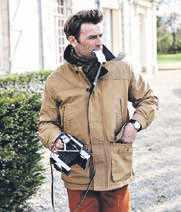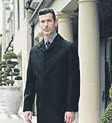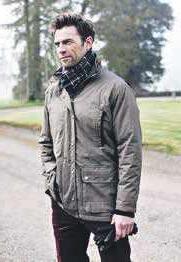






Two years later
Images of loss and endurance Page 4
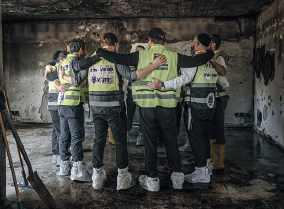









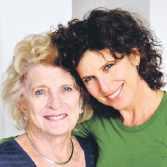

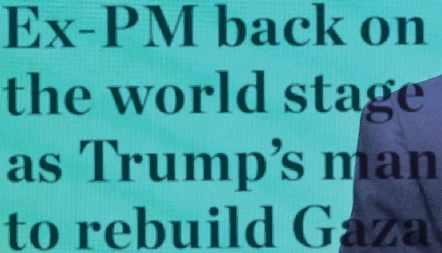
Sir Tony Blair was thrust back onto the world stage this week after Donald Trump named him as part of a new interim authority to rebuild Gaza, writes Adam Decker.
The US president’s 20-point plan was revealed on Monday evening as Israeli Prime Minister Benjamin Netanyahu threw his support behind the plan, aimed at ending the two-year conflict. Trump claimed he is “beyond very close” to reaching a peace agreement that could “potentially be one of the great days ever in civilisation”.
The plan states that, if both sides agree, there will be an immediate ceasefire, the withdrawal of Israeli forces to “the agreed upon line” and the release of all the hostages, followed by the release of Palestinian prisoners and a surge of aid into Gaza.
Gaza will then be temporarily governed by a transitional committee of qualified Palestinian and international experts, with oversight from a new international transitional body, referred to as the “Board of Peace”.
The Board of Peace will be chaired

by Trump, working alongside other international leaders, including Sir Tony. This body will set the framework and handle the funding for the redevelopment of Gaza until the Palestinian Authority has undergone su cient reform that it can take over.
However, Hamas has not yet agreed to the plan. Without the terror group’s participation, diplomats acknowledge the framework risks collapsing before it is implemented. It has been given until Friday to respond.
Continued on page 4
Keir Starmer received a standing ovation during his keynote speech to the Labour Party conference as he claimed recognition of Palestinian statehood by the UK had restarted hope for a two-state solution, writes Lee Harpin.
He offered only a brief reference to the conflict in the Middle East near the start of Tuesday’s hour-long address.
Speaking at a time of growing criticism over his leadership and anger within the community over his decision to recognise Palestine, Starmer told the Labout faithful: “I support e orts to end the fighting, release every hostage and scale up aid to Gaza.
“All sides must now come together to bring this initiative into reality because we must restart the hope of a two-state solution, a safe and secure Israelk alongside the longprimised Palestinian state – a state that this country now recognises.”
This drew applause from most present, though some Jewish attendees stayed seated.
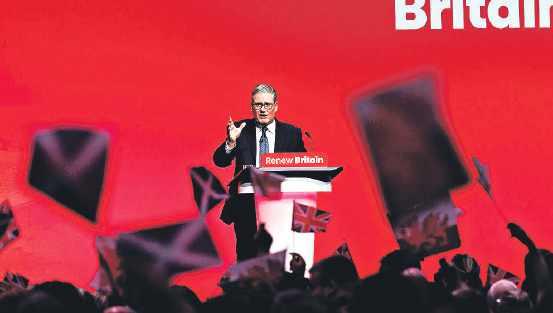
MPs, peers and other Labour delegates were given the flags of England, Wales and Scotland to wave during the PM’s speech, which took place without any of the expected stunts or heckling from pro-Palestine activ-
ists, and without any sign of any Palestinian flags raised in the hall.
Labour peer Lord Mike Katz later told Jewish News: “This was the PM’s best conference speech yet. He set out clearly what he
Rachel Reeves’ speech at the Labour conference was interrupted by a pro-Palestine activist who began shouting about the “mass starvation” just as the chancellor was setting out measures the government had taken to protect key British industries, writes Lee Harpin.
As Reeves defended measures taken by the government to protect the steel industry, an activist, later named as “Sam P”, stood up with a large Palestinian flag and said: “Why is Britain still arming Israel?”
Reeves was given a standing ovation from the delegates as she continued speaking, noting the government had recently recognised a Palestinian state, but was now in power and was no longer a party “of protest”.
The heckler was removed from the hall and the incident dealt with by internal security sta , security sources said.
The Palestine Youth Movement and London for a Free Palestine groups later claimed responsibility for the stunt.
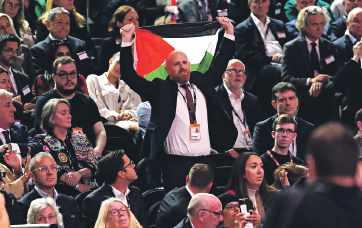
Merseyside Police said there was “no police involvement” following the incident.
In a statement issued by the protest groups following the disruption, the activist said: “It’s unbearable to watch this British-backed genocide unfolding on our screens while Labour carries on with business as usual.
“We should do whatever we can to push for an end to the atrocities.”
Reeves said she is facing “harsh global headwinds” as she hinted at further tax rises to come in the Budget.
The chancellor used the 30-minute speech to insist
she would keep control of the public finances and pledged she would “not take risks with the trust placed in us by the British people”.
She urged party members to “have faith” because Labour and Britain “have overcome greater challenges than these”.
She promised “a Britain where every child can flourish, no matter their background or their parents’ jobs or where they grow up – and never let anyone tell you that there’s no di erence between a Labour government and a Conservative government.”
The Labour conference voted to support a union-backed motion accusing Israel of committing a genocide in Gaza and calling for a full arms sale ban by the UK government, writes Lee Harpin.
The result provoked a furious response from the Jewish Labour Movement, which said the motion, proposed by public service union Unison and seconded by Aslef, the train drivers’ union, “barely pays lip service to the 48 hostages held by terrorists in Gaza” and “neglects to mention 7 October”.
In Tuesday’s vote, delegates rejected a motion seen as more supportive of the leadership position on the conflict under Keir Starmer in favour of one demanding the government “employ all means reasonably available to prevent the commission of genocide in Gaza, fully suspend the arms trade with Israel and the UK-Israel trade and partnership agreement”, and accept the findings of the UN inquiry”.
With all the unions supporting the more hardline motion, and carrying 50 percent of the total vote, the measure easily passed on a show of hands in the conference hall.
In a statement after the result, Jewish Laboiur Movement national chair Ella RoseJacobs, said:” JLM are hugely disappointed to see that, thanks to union votes, Labour Party conference has voted for a motion on IsraelPalestine that neglects to mention October 7th or Hamas and barely pays lip service to the 48 hostages held by terrorists in Gaza.
“This emergency, non-binding, motion is not the route to the two-state solution our Labour
stands for and a clear choice – division and decline with Reform and populists of left and right, against Labour’s patriotic project to unite and renew our country. He challenged Farage’s grievance narrative and his constant talking our great country down.
“For our community, as much as anyone else, we need to reject these politics of discord – we fool ourselves if we think the racists won’t turn their hate on us eventually. Keir called that out and set out a programme of renewal for the country – ending decline, reforming our public services and growing our economy from the grassroots.”
Starmer put controlling immigration, growing the economy and restoring pride in Britain at the heart of his plan to take on Nigel Farage’s Reform UK.
The prime minister said securing the borders was a “reasonable demand”, but he hit out at people including Farage who cross a “moral line” on the issue.
Amplifying his comments on Reform, the prime minister added: “There is a line, a moral line, and it isn’t just Farage who crosses it.”
government is working towards.
“While the debate itself was conducted with civility, the outcome is not what we’d expect to see from a Party of government. We urge the government to continue to pursue a path of peace for all Israelis and Palestinians.”
Jewish News understands JLM decided against supporting either motion after consulting with its members.
In a well-received speech, Jewish Labour councillor Joshua Garfield warned passing the hard-line motion would “dishonour” the family of Sharone Lifschitz, the daughter of kidnapped Israelis – one murdered, one freed after the 7 October massacre – who was speaking at events in Liverpool that day. “Sharone chooses not vengeance, but peace,” said Garfield.
“The peace her murdered father, Oded, believed in – from a kibbutz that escorted Palestinians to life-saving surgery.
“Her mother Yocheved, who lost everything yet still calls for reconciliation. Her father, who worked on the ground for coexistence and understanding between Palestinians and Israelis, did more for peace than most of us will ever manage.”
Garfield added: “That is not the easy path. It is the hardest. But it is necessary. We would dishonour Sharone’s family, her ransacked community, and thousands of war victims if we pass a motion that ignores Hamas; does not even say the word ‘Hamas’.”
The result of Tuesday’s vote is non-binding and will not be taken up as Labour Party policy. However, it will be used by the left as further evidence of discontent with Starmer.
by Lee Harpin @lmharpin
Israeli and Palestinian voices this week refused to rule out the prospect of a peace process leading eventually to a two-state solution during a frank and often intense debate at an event put on at the conference by Labour Friends of Israel.
The panel event took place without disruption in front of a capacity audience, including senior o cials with the Palestine Solidarity Campaign.
Pro-Palestine activists aligned with far-left organisations had staged demos outside the arena since delegates began to arrive on Saturday, but many held aloft the banners of the Socialist Workers Party rather than those of Labour.
On the panel, which was chaired by Labour MP Damien Egan, were Nivine Sandouka, a Palestinian peace campaigner and regional director of the AllMEP group; Middle East minister Hamish Falconer; Michael Ste-
phens, a senior policy adviser with the Royal United Services Institute, and Dr Jonathan Cummings, an aide to Yair Golan, the leader of Israel’s Democrats party.
Sandouka implored the international community to put in more e ort to empower moderate Palestinian voices, including in the Palestinian Authority, saying: “We want to live a normal life.
“We are sick of this situation; we want a normal life.”
She added: ”We find people in Israel and Palestine courageous enough to stand up and say ‘Enough’.
“We know what it takes to bring sustainable peace from the grassroots level — a transformative role for civil society.”
But she warned: “I’m a Palestinian, and I see my people, and also the Israelis, going more towards extremism and towards radicalisation with the continuation of the conflict and continuation of the war.
“The moment there is a political horizon, the moment there is eco-
nomic stability, there is better education for peace, there are changed narratives, together with, or parallel with, a regional approach of investment and openness, and a better future. That’s when people are going to immediately refuse extremism.”
Stevens noted: “It is encouraging for the first time we have a plan backed by the USA. The US is the biggest player in the room. If they don’t back a plan, it won’t happen – I do not believe that the Abraham Accords are dead in the water.”
Minister Falconer spoke of “the extent of scarring that an event of this length and severity has on Israelis and Palestinians alike”.
He added: “The news recently has been more promising, and there have been some signs of momentum towards serious negotiations.
“To have a permanent ceasefire, you have to address the question of who is going to be in charge of Gaza.
“If you want someone in charge of Gaza, you want Palestinians in charge of Gaza: moderate Palestin-

ians who recognise Israel’s right to exist. The only entity capable of meeting these criteria is the Palestinian Authority. It’s flawed, but there’s no alternative around this.”
He added: “Hamas are no friends to the region. There is a window to get rid of them but we have to focus on the challenges that disarmament represents, while the region has a consensus on it.”
Cummings added: “The path to go down is to work with a legitimate, capable Palestinian Authority […] PA reform and Palestinian elections
are so important. In the end, Palestinians will have to decide for themselves. The heavy lifting will have to be done by Israelis and Palestinians – that will require rebuilding support for the kind of moves we will have to take to find agreements and mechanisms that work.
“Only by building a new Israeli government that has a mandate to embark on this di cult process can we get out of this.
“Israel is a deeply risk-averse country after 7/10 — but there’s a silent majority who are amenable.”
Benjamin Netanyahu accused the UK and other nations embracing Palestinian statehood of sending a message “murdering Jews pays o ”.
Speaking to the UN General Assembly, the Israeli prime minister also dangled the hope of future peace deals with near neighbours Syria and Lebanon – but appeared to rule out the prospect of a Palestinian state because of its “rejection” of a Jewish homeland.
Many UN delegates walked out of the hall as Netanyahu began his speech, in protest at his conduct during the war against Hamas in Gaza.
Netanyahu claimed to represent the voices of the “families of hostages languishing” in the tunnels in Gaza.
He announced Israel had set up loudspeakers in Gaza ahead of his speech “ in the hope that our
dear hostages will hear me,” and went on in Hebrew and then in English:
“Our brave heroes, this is Prime Minister Netanyahu … we have not forgotten you. We will not falter and we will not rest until we bring you home.”
He then named the remaining hostages before demanding Hamas release them so the war in Gaza could end immediately.
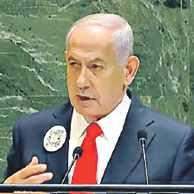
Turning to the recent moves by the UK, France and other Western allies to recognise a Palestinian state, he had harsh criticism.
“This week, the leaders of France, Britain,
The Jewish Labour Movement has confirmed that after consulting members it has nominated Bridget Phillipson for deputy leader of the Labour Party.
Phillipson won 72 percent of the vote while Lucy Powell received 28 percent, from members who participated.
National chair Ella RoseJacobs said: “The Jewish Labour Movement has been a liated to the Labour Party since 1920 and takes our rights and responsibilities seriously.
“After an excellent turnout from our members we are delighted to nominate Bridget Phillipson MP to be deputy leader.
“We trust her to safeguard the hard work of Keir Starmer MP in ridding the Labour Party of antisemitism and taking us forwards as Labour continues the vital work of government.”
Many JLM members are believed to have disapproved of Powell’s shadow cabinet roles under Jeremy Corbyn.
Phillipson said: “I’m hon-
oured to receive the support of the Jewish Labour Movement. Like JLM, I am determined our party and Labour government are focused on shaping our future, not arguing about the past.
“I will be a voice for members and our a liated societies round the Cabinet table — bringing Labour’s heart and soul into government.
“As deputy leader, I will unite the party, tell Labour’s story, and make sure we bring the change people chose — ensuring we defeat Reform.”
Australia, Canada and other countries unconditionally recognized a Palestinian state. They did so after the horrors committed by Hamas on 7 October –horrors praised on that day by nearly 90 percent of the Palestinian population.”
“You know what message the leaders who recognise the Palestinian state this week sent to the Palestinians?” Netanyahu said. “It’s a very clear message: murdering Jews pays o .
“Over time, many world leaders buckled. They buckled under the pressure of a biased media, radical Islamist constituencies
and antisemitic mobs. There’s a familiar saying, when the going gets tough, the tough get going.
“Well, for many countries here, when the going got tough, you caved,” Netanyahu said.
He added:”Behind closed doors, many of the leaders who publicly condemn us privately thank us. They tell me how much they value Israel’s superb intelligence services that have prevented, time and again, terrorist attacks in their capitals.”
But the Israeli PM also appeared to play into the hands of those who say he has no interest in ever seeing a two-state solution.
He claimed:”Giving the Palestinians a state one mile from Jerusalem after 7 October is like giving Al Qaeda a state one mile from New York City after 11 September.”
Owen Jones had his access to the conference revoked, hours after an attempt to challenge the government’s antisemitism adviser, Lord John Mann, over his views on Israel backfired.
The left-wing commentator, who resigned from Labour last year, was notified via email that he had been banned from the conference ahead of Keir Starmer’s speech on Tuesday.
Jones claimed the ban was a result of “an attempt to question Cabinet members and
MPs about Britain facilitating Israel’s genocide.” However, Jewish News has learned that the Guardian columnist was left “red-faced and flustered” after trying to confront Lord Mann at the conference.
According to witnesses, Jones approached Mann with a videographer and said he wanted to discuss speeches Mann had made about Israel. The peer reportedly responded, “What speeches?” Jones hesitated and replied, “I will have to Google them.”
“At that point, Lord Mann took hold of the microphone and said he wanted to interview Jones about his own views on Israel,” a source told Jewish News. “Jones went a bit red and started to look a bit frightened... Mann then asked Jones about his views on a twostate solution. Jones said he believed in one state. It looked like Lord Mann continued the interview with Jones’s videographer. Jones was clearly annoyed, but many of those who witnessed the exchange were laughing at him.”
by Daniel Sugarman
Reform UK’s Deputy Leader, Richard Tice, has told Jewish News of the impact of visiting the site of the Nova massacre during his first visit to Israel, saying: “It will take a while to process it.”
The MP for Boston and Skegness described how “in terms of the impact – visiting the site of the Nova music festival, now a memorial, talking to survivors from that horror, talking to emergency responders on the day, it will take a while for me to process it all, because it’s just so enormous.”
Tice who was in Israel this week for a four-day visit, also met Israel’s President and Foreign Minister, visited Yad Vashem and the United Hatzalah headquarters, and saw for himself the aid operation taking place at Gaza’s border.
He was taken around Kibbutz Kfar Aza by Mandy Damari, mother of former hostage Emily Damari. He described how “walking around the kibbutz, seeing houses where the terrorists just brutally slaughtered people, was just utterly horrifying, and that will stay with me forever.”
The MP for Boston and Skegness raised in Prime Ministers Questions a couple of months ago about how Emily Damari had confirmed, after her release, that she had been held in UNRWA facilities. He said this
had reinforced his concern “that UNRWA is riddled with Hamas sympathisers, and so I challenged the prime minister on that. We shouldn’t be funding UNRWA.
“I have deep concerns about, frankly, the performance of the wider UN and what I believe is a bad level of antisemitism amongst large chunks of the UN, ridiculous people like Tom Fletcher [the British UN UnderSecretary General for Humanitarian Affairs] spouting lies about famine amongst babies in Gaza.”
He also visited the Kerem Shalom border crossing into Gaza, where he saw “humanitarian aid being transported in considerable quantities, standing amongst pallets and pallets of fresh fruit, avocados, bananas, onions, as well as other staples, flour, sugar and the like.
“Those palettes - they hadn’t just brought them in for me. So that was also very educational. It allows me to talk with great knowledge about some of the absolute twaddle and nonsense talked about by the Left in the United Kingdom, both in the House of Commons and outside.”
Last month, speaking at Britain’s March Against Antisemitism, Tice said antisemitism in the House of Commons “was “way, way higher than 21 percent” – a reference to a YouGov poll about antisemitic attitudes in the UK in general.
“I stand by what I said”, he told
Continued from page 1
“It will be headed by a gentleman known as President Donald J Trump of the United States.” He added: “We’ll do it right, and we’re going to put leaders from other countries on and leaders that are very distinguished leaders. And we’ll have a board, and one of the people that wants to be on the board is the UK former Prime Minister Tony Blair and some others.
“They’ll be named over the next few days, and it’ll be quite the board. Everybody wants to be on it now.”
Health Secretary Wes Streeting acknowledged that Blair’s legacy in Iraq will prompt questions about his suitability for the role: “There’ll be people who look at Tony Blair and his legacy in Iraq and will raise eyebrows, to say the least, about whether he’s the right man to be involved in this. But he also had an incredible legacy in Northern Ireland of bringing together sworn enemies to build a peace that has lasted.”
Sanam Vakil, of Chatham House’s Middle East and North Africa Programme, described the Good Friday Agreement as “a different process with different players,” but said the UK appeared keen to position Blair as a key candidate for the Gaza role.”
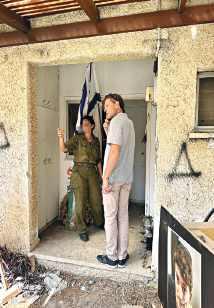
Jewish News. “There is a high level of antisemitism, a shameful level of antisemitism in the House of Commons. It is as simple as that. And when I stand to support and thank and defend Israel, I can feel it, from the people sitting behind me to the people sitting opposite me.”
Last week tAustralia’s opposition leader announced her party would reverse recognition of a Palestinian state if they came to power – would Reform, who have strongly criticised the British government’s similar move, respond the same way if they win power? Tice says of recognition: “We think it’s completely the

wrong action and therefore, implicitly, that goes without saying.”
The primary focus now, however, is on the peace deal put forward on Monday night by the Trump administration and agreed to by Israel and a wide range of Arab countries.
“I think our hopes and prayers at the moment are that this peace deal happens”, he says.
“There’s no recognition of a Pal-
estinian state within this peace deal, quite rightly… the overriding sense here in Israel is that people are hoping and praying that all the hostages are immediately released and that Hamas has no future involvement in running or managing Gaza, and that therefore everybody can try and rebuild, with all the challenges involved, towards a peaceful future.”
British-Israeli academic Sharone
Lifschitz addressed a Jewish Labour Movement (JLM) event at the Labour Party conference, querying why many British Jews felt compelled to oppose recognition of a Palestinian state as a show of solidarity with hostage families.
Lifschitz, whose father Oded, 84, was killed by Hamas terrorists after the 7 October massacre and whose mother Yocheved was freed after being captured at Kibbutz Nir Oz, gave a moving speech to a packed room in Liverpool.

community here felt they had to oppose the recognition of the State of Palestine on behalf of the hostage families.
Well, in Israel, so many of us were so desperately trying to do everything possible to bring about a diplomatic solution.”
She added, “If there’s anything I learned from my father...it’s that making peace is not easy. You may know more about the peace agreement in Northern Ireland: it’s almost bloody, just without the blood.”
international community to intervene and help bring about a diplomatic solution.
The JLM fringe event took place after the Labour conference passed a motion calling for a full arms embargo on Israel and accusing Israel of committing genocide in Gaza –without reference to the 7 October massacre.
Labour minister and Finchley and Golders Green MP Sarah Sackman relayed a message from the party leadership to JLM activists, clarifying that this was not a position the leadership supported. Sackman acknowledged the challenges politics presents to the community, but also welcomed the influx of young activists.
She recalled lessons from her father, a veteran Israeli peace activist, journalist, and founding member of Kibbutz Nir Oz, highlighting that peace agreements are often “as imperfect as can be,” but that “the only thing it’s better than is war.”
Reflecting on her experience, Lifschitz admitted, “The last weeks were a bit confusing for me, in the sense that a lot of the Jewish
Lifschitz described the current reality for border communities in Israel: “At the moment, we are part of a horrific, horrific war. It’s beyond anything we, the border communities, have ever experienced. I spend a lot of time in the south of Israel, and the rhythm of life is birdsong and explosions – endless explosions. It turns the heart.”
She also read a letter signed by numerous hostage family members in Israel, urging the
Baroness Anderson noted that while progress had been made in combating antisemitism in Labour, there was still work to do, and Jewish members must not give up the fight.
JLM’s national chair, Ella Rose-Jacobs, and national secretary, Miriam Mirwitch, also received loud cheers as they delivered defiant messages to activists at the event.
Lord Katz also delivered a well-received speech in which he also warned about the rise in support for divisive politics around Nigel Farage’s Reform Party.
A report by watchdog UN Watch has accused Hamas of hijacking the United Nations Relief and Works Agency (UNRWA), embedding its operatives as school principals, union leaders and senior educators across Gaza and Lebanon, writes Annabel Sinclair.
The major 120-page dossier, Schools in the Grip of Terror, alleges UNRWA knowingly employed Hamas o cials for decades, despite public evidence of their terror ties.
UN Watch, which is based in Geneva, says the Western-funded relief agency, which receives more than £820 million in grants annually, has “institutionalised extremism” rather than neutrality.
The report concludes: “By employing Hamas leaders as school principals and union heads, UNRWA didn’t just tolerate extremism – it turned classrooms into incubators of hate.”
According to Israeli intelligence cited in the findings, more than 15 percent of UNRWA senior educators in Gaza are members of Hamas or Palestinian Islamic Jihad.
Among those named in the document are Suhail Al-Hindi, a Hamas o cial who also headed UNRWA’s Gaza teachers’ union, and Fateh Sharif, long-time leader of the UNRWA
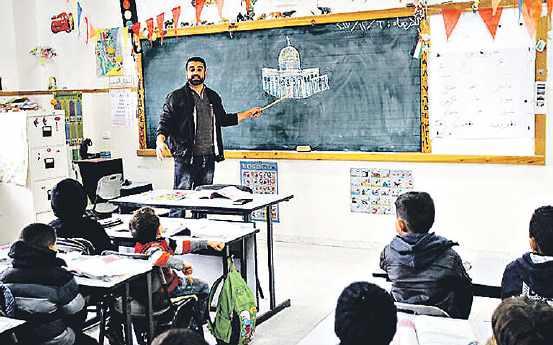
Lebanon Teachers’ Union and a senior Hamas operative.
The report highlights how Hamas-led sta unions repeatedly blocked attempts to discipline teachers, reform textbooks or intro-
duce Holocaust education. It recounts how Al-Hindi was briefly suspended in 2011 for attending Hamas rallies but reinstated after mass protests paralysed UNRWA services.
UN Watch points to contrasting treat-
ment of international and local sta : in 2021, UNRWA Gaza director Matthias Schmale was expelled after saying Israeli strikes were “precise” yet Al-Hindi praised Hamas leaders openly while remaining in post for years.
Stéphane Dujarric, spokesperson for UN secretary-general Antonio Guterres, defended the UN’s record when asked why a Hamas terror chief had long overseen 2,000 UNRWA teachers.
“Most people who are engaged in underground organisations try not to have their involvement known publicly,” he said.
The findings follow the scandal over a 3,000-member UNRWA sta Telegram group exposed in 2024, where employees celebrated the 7 October Hamas massacre.
An “independent review” led by former French foreign minister Catherine Colonna acknowledged UNRWA unions were “politicised” but was criticised as biased.
Despite those conclusions, UN Watch says none of Colonna’s neutrality recommendations has been implemented a year later.
The report comes just weeks after the UK government pledged a further £20 million to UNRWA. Britain is one of the agency’s largest donors.
For over 120 years JNF UK has worked tirelessly to develop the Land of Israel.

Much of our work has only been possible thanks to the generosity of our legacy donors like Eric, who regarded the work of JNF UK as vital to realising the Zionist dream.
Leaving a gift in your Will, no matter how small or large, is one of the most valuable ways you can forge an everlasting bond with Israel.
Our professional and caring Legacy Team offer a range of professional services and first-rate pastoral care.
To find out more, please get

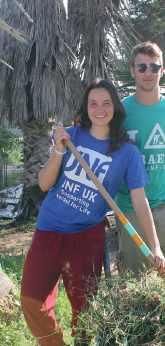





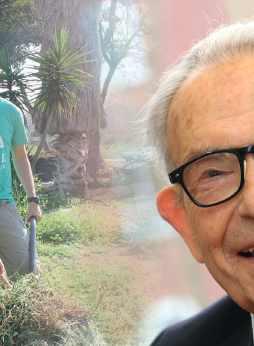

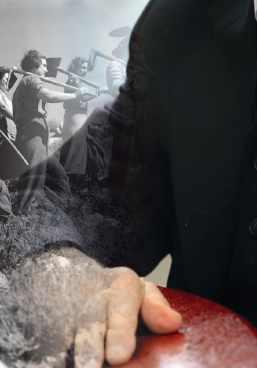

A Holocaust survivor and her husband who told loved ones in an email that they had taken their own lives in a Swiss clinic had “had enough” and did not want to “just exist”, a friend has said, writes Joy Falk.
Actress Ruth Posner and her husband Michael, both in their 90s, are believed to have died last weekend in the Pegasos clinic in Basel.
Mrs Posner had escaped a ghetto in Radom, later disguising herself as a Catholic. She arrived in the UK as a teenager, having lost most of her family in a concentration camp in the Second World War.
She met her husband Michael, a Jewish chemist who was born in Belfast, at a dance in London and they went on to spend almost 75 years together.
In an email to loved ones this week, first reported by The Times newspaper, they told the recipients: “When you receive this email we will have ‘shuffled off this mortal coil’.
“The decision was mutual and without any outside pressure. We had lived a long life and together for almost 75 years. There came a point when failing senses of sight and hearing and lack of energy was not living but existing, that no care would improve.”
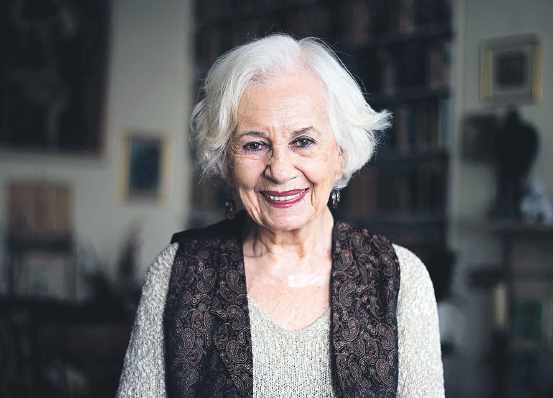
Close friend Sonja Linden, a playwright who worked with Mrs Posner during her acting career, said the pair had told the email recipients how they had enjoyed their life together, apart from the great sadness of losing their son when he was aged in his 30s. They are believed to be survived by a grandson.
Mr Posner had attended Queen’s University in Belfast before qualifying as a chemist, and the pair went on to live in various countries around the world before spending their later years in north London.
Ms Linden said while she was “very sad” at her friends’ deaths, she understood why they had taken the decision.
She added: “I completely endorse their decision but it was still weird to receive that email, written in her style. It was clearly from her and had been pre-written.”
Ms Linden said Mrs Posner had been in favour of a law change to legalise assisted dying in England.
She said: “She wouldn’t have had to make those arrangements, had to travel, she could’ve said goodbye more publicly.”
While a draft law is being considered at Westminster to legalise assisted dying in England and Wales, it would apply only to terminally ill adults with fewer than six months to live.
It is understood neither of the Posners were terminally ill.
Campaign Against Antisemitism (CAA), said it was “heartbroken” to hear of the pair’s passing.
She described Mrs Posner as having been “the most vibrant, amazing woman” and Michael as a “remarkable, clever, intellectual man”.
Speaking to the PA news agency, Ms Linden said of Mrs Posner: “She felt increasingly, every time I visited her over the last year, she said ‘we’ve had enough, we’re ready to go, we don’t want to just exist. And that’s what we’re doing, we’re just existing at the moment’.”
Lady Victoria Starmer appeared visibly moved as she listened to survivor Annick Lever share her powerful testimony at the Holocaust Educational Trust’s fringe event at the Labour Party’s conference, writes Lee Harpin.
The Prime Minister’s wife attended Sunday afternoon’s event in Liverpool to highlight her own commitment to Holocaust education.
Newly appointed Schools Minister Georgia Gould OBE MP also addressed the packed room of parliamentarians and activists, stressing both her proud Jewish identity and determination to ensure children learn the lessons of the Shoah in today’s increasingly divided society.
Lever, who was born in November 1943 in Nazi-occupied France to a Jewish mother and a Catholic father, recalled how after the German invasion in 1940 her family had to register, declare all their possessions, and, from 1942, wear a yellow star on their clothing.
Their identification papers were stamped with the word ‘Jew’, and a curfew was imposed, preventing Jewish people from being out of their homes in the evening.
In early 1944, Annick, along with her mother, aunt with a baby, and grandparents, were taken to a local prison and kept there pending deportation to Drancy (France’s main transit camp).
Her father, as a non-Jew and a member of

the Resistance, was able to smuggle Annick and her baby cousin out. The rest of the family was transported by cattle car to Birkenau. They did not survive; she later learned her mother almost certainly died on the journey.
Lever urged everyone to recognise that “we are all human beings, and we must learn to respect each other for who we are.” She added that for the Nazis, her mother’s “only crime was being born Jewish.”
Gould spoke of her admiration for the HET’s work, and of how her mother taught her about the Holocaust while she was growing up.
Describing the privilege of hearing from survivors, she said: “I think you’re completely changed by every one of those stories – by how ordinary people can commit terrible evil, but also by how ordinary people, like survivors, can find hope afterwards and tell their stories every day to build a better world.
“So I think it is critical for children to learn about this. That’s why it is on the national curriculum, and why the work of the Holocaust Educational Trust is so important.”
Holocaust Educational Trust Chief Executive Karen Pollock CBE said: “Annick shared her remarkable testimony at our fringe event, leaving a powerful impression.
“Every year, tens of thousands of young people hear from Holocaust survivors through our Outreach Programme. It is vital that the country’s leaders, decision makers, and opinion formers also hear Annick’s story.
“Her experiences are a stark reminder of what can happen when antisemitism and hatred go unchecked, and of the responsibility people in public office have to ensure that the horrors of the past are never repeated.”
Lever and her husband also met Education Secretary Bridget Phillipson ahead of the event.
Lady Starmer and the PM visited AuschwitzBirkenau in January.
The group said Mrs Posner had spoken “publicly of her experiences during the Holocaust, educating future generations and never shying away from taking part in the fight against antisemitism”.
An Israeli DJ known for strong support of Israeli-Palestinian coexistence has had his performance cancelled by a UK events company, due to “solidarity with the Palestinian struggle”.
Origins Sound had planned an event with Roi Perez. However, the company cancelled after reading a “statement from Ravers for Palestine”, which described Perez organising an event in November 2023, with funds to “directly help survivors and evacuees of the 7/10 massacre, unsheltered Bedouin communities, displaced Palestinian communities due to settler violence, queer Arabs in both Israel and Palestine in need of professional psycho-social counselling and other underserved groups.”
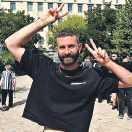
The ”Ravers for Palestine” claimed this “fully embodies the eliminationist project of liberal Zionism. The settler as innocent victim of senseless Native ‘massacre’. Caveated scraps available for the natives deemed recuperable or nonthreatening: the ‘loyal’ Bedouin model minority, plus queers (ergo, Natives who aren’t at risk of producing more Natives).”
Perez, who is gay, is a long-time supporter of the LGBT community.
















Health secretary Wes Streeting has launched an unprecedented attack on the UK’s medical regulation system, saying he has “no confidence” in its ability to keep patients safe after a doctor who called for the ethnic cleansing of Jews from Israel was allowed to continue practising, writes Richard Ferrer.
Dr Rahmeh Aladwan has become infamous within the British Jewish community for such claims as “the UK is occupied and controlled by Jewish supremacy – in fact, most Christian majority countries are”.
She has also called the Royal Free Hospital in London a “Jewish Supremacy Cesspit”.
Last Thursday, the Medical Practitioner Tribunals Service (MPTS) ruled Aladwan, who has parroted extreme far-right talking points like the idea that “Rabbis need to reject the Amalek commandment and the notion that non-jews are lesser than goyim”, is fit to practise medicine while a General Medical Council investigation into her continues.
In a strongly worded statement to Jewish
News, health secretary Streeting responded to the MPTS ruling, saying: “The racist language of ‘Jewish supremacy’ reflects the values of Nazis, not the NHS.
“I fail to see how medics using such language with impunity doesn’t undermine confidence in the medical profession. I have no confidence in the ability of our medical regulation system to keep patients safe and I am taking urgent advice on next steps.”
Aladwan, a member of Palestine Action until the group was banned under terror legislation in July, has also made no secret of her thoughts on Hamas. She has posted: “I don’t condemn Hamas. I don’t condemn October 7. I don’t condemn armed resistance to Occupation. I condemn ‘Israel’.”
The CST described her conduct as “truly appalling and highlights why action must be taken. She should be disciplined accordingly”.
The GMC has insisted “antisemitism and all forms of prejudice have no place in healthcare”, but the ruling has prompted criticism
• Tax-efficient investing before and after Aliyah
• Tax-efficient income after 10-year tax-free period
• Receive your entire pension pot tax-free
• Specialist portfolio management for Olim
• No Inheritance Tax (for non-UK-situated assets)
We are seasoned experts in providing long-term financial planning advice for those making Aliyah. Scan the QR code to read more
With investing, your capital is at risk. Tax treatments are subject to individual circumstances and are subject to change.

from Jewish community groups who argue the decision risks undermining trust in the profession. Streeting’s comments pile further pressure on the GMC and the MPTS to explain how such cases are handled.
The MPTS told Jewish News it did not comment in individual cases.
The tribunal determination, which this newspaper has seen, stated that as per the information provided to it, Aladwan had not fallen foul of exceptions to a doctor’s right of free expression. Exceptions include “Allegations a doctor is promoting and/or spreading misinformation which has the potential to harm public health or undermine public confidence in the medical profession”.
Editorial comment, page 22
Lawyers in the United States have filed a case at the International Criminal Court (ICC) demanding arrest warrants for Iran
Supreme Leader Ayatollah Ali Khamenei and the Revolutionary Guard commander Esmail Qaani over their alleged role in the 7 October massacre that claimed the lives of Shiri Bibas and her young sons Ariel, 4, and Kfir, just nine months old.

The filing, submitted in The Hague by human rights attorney Elliot M. Malin and former US Justice Department war crimes prosecutor Eli M. Rosenbaum, cites FBI intelligence linking Tehran to Hamas’s atrocities.
It accuses Iran of providing weapons, training and direction to Hamas, enabling the group to commit genocide, war crimes and crimes against humanity.
The lawyers acted on behalf of Maurice Shnaider, whose relatives were murdered and abducted from Kibbutz Nir Oz.
His sister Margit Shnaider Silberman and her husband José Luis were killed when their home was torched.
Their daughter Shiri Bibas and her children Ariel and Kfir were kidnapped to Gaza and later killed.

Join us for a commemorative event






Central london - 2pm
Honouring the lives lost on 7th October 2023 AND calling for the release of the hostages

































A Jewish family’s summer holiday in France turned traumatic after discovering a swastika gra ti on the ceiling of a pool house at their Airbnb rental.
Joel [surname withheld on request], whose maternal grandparents fled Nazi Germany while many of family were murdered in the Holocaust, said the discovery was deeply distressing – but Airbnb’s handling of his complaint compounded the pain.
“Finding a swastika on the property was bad enough, but Airbnb’s response – claiming it was in an ‘inac-
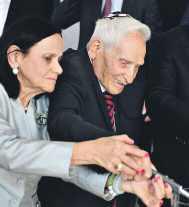
cessible’ area – was frankly insulting,” he told Jewish News. “At no point have they addressed the issues I raised, and despite asking multiple times I have never received an o cial apology.
“They even sided with the host at first, insisting they had no knowledge of the symbol, despite the host telling me directly that they did.
“For me, this is especially painful as I am having my German citizenship reinstated after it was stripped from my grandparents by the Nazis.
“This isn’t about customer service,
it’s about how one of the world’s biggest platforms treats antisemitism.”
Although he and his family continued with their holiday, Joel said the symbol – and Airbnb’s subsequent response – left a lasting impact.
Airbnb has o ered Joel a refund of £8,900 for the booking but declined his request for an o cial apology or compensation.
In a statement to Jewish News, the company said discrimination had no place on Airbnb and it took all reports seriously. A thorough investigation
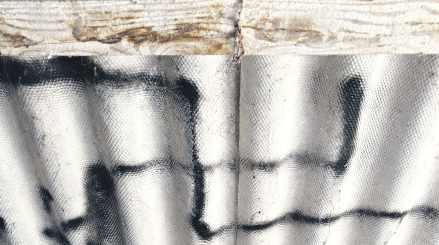
found the host had no knowledge of the “o ensive” gra ti until the guest reported it and as soon as they were made aware took action to address it.
Displaying Nazi symbols is illegal in France, and Joel said the case raises
wider questions about how global corporations respond to antisemitism.
“The fact this swastika remained in place shows how some still view antisemitism. For Airbnb to treat it so lightly is shocking,” he added.
Aron Bell, a Holocaust survivor and last remaining brother of the famed Bielski partisans who saved more than 1,200 Jews from the Nazis during the Holocaust, has died at 98.
Bell, who changed his name from Aron Bielski, was born in 1927 in Stankiewicze, part of presentday Belarus, as the youngest of 10 brothers and two sisters. After the German army arrived in Stankiewicze in July 1941, the town’s Jews were imprisoned in the Novogrudok ghetto.
Two of Bell’s siblings, Abraham and Yankel, and

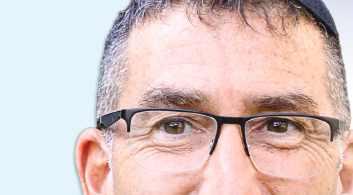
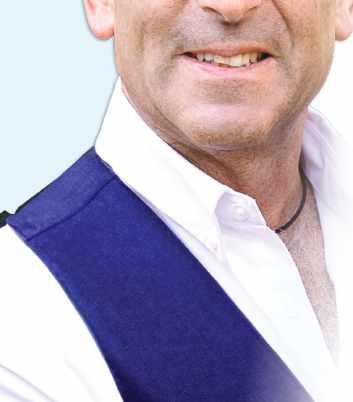























his parents, David and Bella, were murdered but the older Bielski brothers, Asael, Tuvia and Alexander or ‘Zus’, fled to a nearby forest and Aron joined them to form the Bielski Brigade, one of the largest rescue e orts of Jews during the Holocaust.
“If you were in the company of those three brothers, you felt like you had a whole army behind you, you were fearless,” said Bell in a 1996 testimony to the USC Shoah Foundation.
At the forest settlement, where the group established workshops, a bakery, a school and a hospital,
Bell, who was only 11 or 12 at the time, played a key role in sneaking into the nearby ghetto to encourage fellow Jews to escape.
In his diary, his brother Tuvia wrote: “It is Aron who brings life into the community. He finds other survivors and introduces them to our district.” Asael died in 1945 after being conscripted into the Soviet Red Army, Tuvia in 1987 and Zus in 1995.
After the war, Bell immigrated to British Mandate Palestine, served in the army and in 1954 moved to the United States.




It’s 9pm on a chilly Sunday evening, and Nivi Feldman has arrived at a house in Borehamwood to meet Shaun Lemel, a 26-year-old Israeli–American who survived the Nova massacre, writes Michelle Rosenberg.
He’s flown to London with his brother, to give testimony at the Labour Party conference.
The fact it is late and cold is irrelevant to Feldman. She greets the brothers warmly, with hugs. They work on a powerful speech until 1am, after which she goes home, catching scant sleep before they take a train up north.
Nivi leads the UK’s Hostages and Missing Families Forum. Simply put – she never stops. Briefing journalists and campaigners, appearing regularly on TV and radio, organising visiting delegations of hostage families and Nova Festival survivors; launching a project to twin MPs and Peers with hostages, liaising with key communal groups, ambassadors of countries with citizens held captive and hostage vigil leaders.
She is speaking to Jewish News ahead of Sunday’s central London vigil, marking two years since 7 October,
“It’s really devastating”, she says. “When I took the role, I thought it’s going to be two, three months of really hard work, and they’ll be out of there. But we’re still here, fighting every day.”
She joined the Forum in January 2024 and was leading its voluntary efforts by March.
“It’s more than a full time job,” says Feldman, switching between our interview, giving a kiss to her youngest child, last minute co-ordinations

for the Lemels and fending off a nasty cold.
“When I organise a delegation, it takes a week or two around the clock, putting in all the right meetings, getting all the logistics done. When they’re here, it’s making sure they get everywhere they need to and all their needs are met.
“When there is anything Hamas sends out... we work around the clock on press releases, getting interviews, getting the right messages out.”
Forum initiatives include an empty seder table opposite Downing Street and a vigil with orange balloons to mark the second birthday of
Kfir Bibas, (kidnapped and later murdered with his mother and brother). Its members have also been part of unceasing collaborative efforts, including creating posters, stickers, yellow ribbons, dog tags and challah bakes.
How has Feldman managed to continue to operate with laser-like focus?
“What keeps me going is keeping them going,” she says of the hostage families.
“In March, I spoke with the Levinson family. They said, ‘we don’t even have the energy to get out of bed some days. It’s people like you that
come with glimpses of hope and ideas and initiatives that keep us going.’”
The bodies of Shay Levinson, Ofra Keidar and Yonatan Samerano were retrieved in June.
When Feldman goes to Israel, she’s usually “spent more time with hostage families than friends or family... to make sure they know we’re thinking about them, what else we can do.”
Interestingly, “the hostage families overall feel the UK government gives them more time and information than the Israeli government”. However, she called the UK’s recognition of a Palestinian state “really hurtful”. The Forum “was really upset that they’re doing it at a time that there’s still hostages... the needs of the hostages have gone up, they need help more than ever.”
She’s mindful that she “needs to be always really respectful” of all the hostage families, who have a range of political views. “There’s a wide range of people; very right wing to left wing. It was everyone that was attacked that day.”
As everyone scrambles to assess the chance of a Trump-brokered peace deal, Feldman considers the ultimate question.
“Are the hostages going to come home? They have to, they have to. The heart-breaking thing with the Levinson family, was that they thought, okay, Shay came back. They finally closed that horrible circle, but they’re still in that place of, ‘why did it have to happen to our son? Why did it happen to him? Why did he have to go through all of it?’ They’re still not able to move on.”
• Henry Grunwald, page 28



Jewish community groups have expressed dismay after a terrorism case against a member of notorious Irish band Kneecap was thrown out by the presiding magistrate after permission for the prosecution to be taken forward was granted 24-hours too late, writes Daniel Sugarman.
Paul Goldspring, chief magistrate at Woolwich Crown Court, described the proceedings against Liam Óg Ó hAnnaidh, who performs under the stage name of Mo Chara, as having been “instituted unlawfully and are null”.
Goldspring said the proceedings “were not instituted in the correct form, lacking the necessary consent within the six-month statutory time limit set by section 127.”
It is understood that the request for consent was only sent by the CPS to the Attorney General, Richard Hermer, one day after the six-month time limit.
Ó hAnnaidh had been accused
of waving a Hezbollah flag at a concert in Kentish Town in 2024. A band member was also alleged to have shouted, “Up Hamas, up Hezbollah”.
Hezbollah is a proscribed terrorist organisation in the UK. Apart from a genocidal obsession with Jews – its late leader, Hassan Nasrallah, reportedly once expressed the desire that all Jews should move to Israel because it would save the group the trouble of going after them worldwide – it helped the Syrian dictator, Bashar al-Assad, murder hundreds of thousands in Syria’s civil war.
The Jewish Leadership Council expressed disappointment at the outcome, saying: “British citizens, including Jews, have a right to expect that allegations involving proscribed, antisemitic terrorist organisations are prosecuted with the utmost care and legality.
“It is deeply disappointing that, in this instance, the charges have been found by a magistrate to be brought in a manner that renders

them ‘unlawful.’
“We have a right to expect that serious o ences involving proscribed terrorist organisations are prosecuted properly. When they are not, it risks leaving these o ences unaddressed and undermines confidence in the rule of law.”
The Campaign Against Antisem-

The BBC’s Executive Complaints Unit has partially upheld a complaint with regard to the corporation’s livestreaming of a Glastonbury Set by Bob Vylan, agreeing that “the content of this act, taken in the round, can fairly be characterised as antisemitic”, writes Adam Decker.
In a judgment released last week, the organisation’s ECU confirmed that it had received “four complaints about the livestreaming of a performance by the duo Bob Vylan, characterising it variously as containing incitement to violence, terrorism or ethnic cleansing, hate speech and expressions of antisemitism…one complaint argued that the performance also breached the BBC’s standards of impar-
itism summed up how “the Chief Magistrate threw out the charge because the Crown Prosecution Service (CPS) had failed to get the consent of the Attorney General to bring the case”, describing it as “a matter of utter incompetence by the authorities.
“Here is a prime example of how
di cult it is for British Jews to get justice in this country. Not long ago, the CPS dropped all charges after men drove through London in broad daylight with a megaphone shouting ‘F*** the Jews… rape their daughters.’ A lot of Jewish people are starting to throw up their hands in despair at the dire state of our criminal justice system, which clearly is incapable of protecting them.”
There was also significant criticism from the Conservative front bench regarding the Attorney General’s role in the failed prosecution.
Robert Jenrick, Shadow Secretary of State for Justice, asked: “Why was the most senior law o cer in govt not across a highprofile terrorism case? Hermer has either displayed breathtaking levels of incompetence or his hard left politics have influenced his conduct. Every day Hermer is in post he brings fresh embarrassment to the Government.”
tiality.” The unit described how, during the show held in June, Pascal RobinsonFoster, the band’s front man, “led the Glastonbury audience in chanting ‘Death, death to the IDF’ (as well as reciting the slogans ‘From the river to the sea’ and ‘Free, free Palestine’) and an earlier segment in which the same member referred to the boss of a record company he once worked for who ‘would talk about his support for Israel’ and whom he went on to describe in the most abusive terms, using the most o ensive language, also referring to ‘f…ing Zionists’.
The primary weight of the ECU’s condemnation fell on Robinson-Foster’s diatribe against the record company boss.
“References to ‘Free Palestine’ and ‘From the river to the sea’, while viewed by some as implying the disappearance of the state of Israel, can also be regarded as no more than expressions of support for aspirations to a Palestinian state and do not of themselves threaten violent action”, they said, going on to state that “’Death, death to the IDF’ is clearly more problematic, but it is directed at an institution rather than individuals, and one which is not defined by ethnic or religious composition.
Despite the presence of BBC sta at Glastonbury, the livestream of the Bob Vylan set was not pulled. The BBC has not confirmed whether any members of sta have been held accountable.




















“Chai recognises that each of us is unique, with our own journey and challenges.
Here we find connection, meaning and purpose as we face a new chapter in our lives.
With Chai’s support and care we rediscover ourselves.”








The Chai Art Workshop Group (Artist, Etty Debourcieu)
For more information on our extensive range of specialised services and care across the UK, please call our Freephone helpline on 0808 808 4567 or visit www.chaicancercare.org
Nancy Reuben Primary School in Hendon has become the UK’s first Sephardi state school. The 26-year-old institution, which announced plans in July to join the state system, secured voluntary-aided status following the government’s move to impose VAT on independent school fees, writes Michelle Rosenberg.
The conversion to voluntary-aided status was supported by Barnet Council and the Partnership for Jewish Schools (PaJeS).
PaJeS chief executive Rabbi David Meyer said: “We are delighted to celebrate Nancy Reuben’s successful transfer.
“We warmly welcome the opportunity created by the secretary of state and deeply appreciate the exceptional e orts of Barnet Council in facilitating this transition.
“The school governors also deserve tremendous credit for their tireless e orts in ensuring this process reached such a positive conclusion. We believe this exciting juncture will herald increased and exciting opportunities for the school, and we wish Nancy Reuben every success as it embarks on this new chapter.”
Chair of governors Sharon Kelaty added: “This has been a remarkable journey that required dedication, persistence and unwavering belief in our vision.
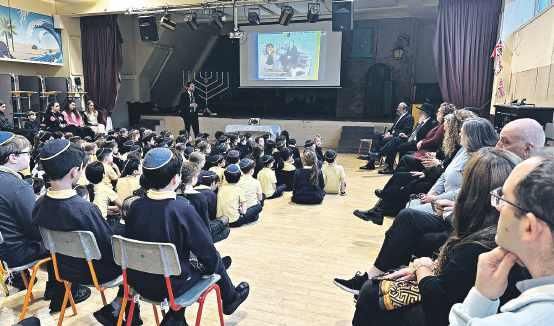
“I am immensely proud of our governing body’s commitment throughout and grateful for the exceptional support we received from our partners. This milestone ensures that future generations of Sephardi families will have access to outstanding Jewish education that truly reflects their heritage and traditions.”
The move meant Joshua Conway, who became school headteacher in 2023, faced the choice of stepping down as head of the school or as a local councillor.
He chose the latter course, telling constituents in his ward his hand was forced “because of an outdated law”.
A Bournemouth museum has confirmed it will stage a delayed exhibition on local Jewish life next October, a year after abruptly shelving the project, writes Michelle Rosenberg.
The show, charting the town’s Jewish community between 1880 and 2020, was due to open at the The Russell-Cotes Museum next month but was withdrawn.
A spokesperson told Jewish News at the time the exhibition had not been cancelled but in planning all exhibitions, the museum carefully assessed any potential risks.
She added: “We recognise this is a sensitive time and due to requirements related to this event, the museum has decided to postpone the exhibition and is working with the organisers to reschedule it for a later date.”
Confirmation of the new 2026 date came as Board of Deputies president Phil Rosenberg visited Bournemouth in solidarity following a spate of antisemitic incidents.
Welcoming the museum’s statement and praising the local community’s “resilience”, he said: “The Russell-Cotes Museum has made the right decision in announcing that the exhibition on the Bournemouth Jewish community will go ahead next October.
“Cancelling Jewish culture out of fear of antisemitism is the wrong approach.
“Celebrating the contribution of our communities and reaching out to our friends and neighbours from di erent faiths and backgrounds is more important now than ever.”



A Proud Past, A Bright Future


Community leaders and frontline services are being urged to take urgent action after harrowing testimonies emerged from young Israeli women brought to Britain under the promise of marriage, only to be trapped in abusive relationships, writes Annabel Sinclair.
Jewish Women’s Aid (JWA) and Rabbanit Ramie Smith, cofounder of GETToutUK, confirmed they are now supporting a rising number of such cases.

The call follows a Jewish Chronicle investigation last week, revealing testimonies from Israeli women under 25 subjected to domestic abuse, sexual violence, and get refusal after being brought to the UK.
Limited places available for September 2025
Tuesday 24th September
Limited places available for September 2025
Calling all Prospective Nursery & Reception families
Calling all Prospective Nursery & Reception families
Wednesday 30th October,
We will be holding open mornings at 10 am
JWA chief executive Sam Cli ord said her organisation had helped six women in such situations in the past six months.
on complex get-abuse cases, said she had supported more than a dozen Israeli women in similar circumstances over the past year, including one married as a teenager.
We will be holding open mornings at 10am
Places available for September 2026
Thursday 14th November
Monday 19th May
Tuesday 24th September
Limited places available for September 2025
Tuesday 21st October
Limited places available for September 2025
we will be holding open mornings at 10am
Wednesday 30th October,
Thursday 22nd May
“Vulnerable young women are being brought here with the promise of safety and stability, but face abuse, control and isolation,” she warned.
“Too many women are trapped for years in the most damaging circumstances, some with children, unable to leave because of legal, financial, or religious barriers,” she said.
Tuesday 28th October
We will be holding open mornings at 10 am
Thursday 14th November
We will be holding open mornings at 10am
Monday 19th May
we will be holding open mornings at 10am
Tuesday 21st October
Thursday 22nd May
Tuesday 28th October
You will have personal tours of our wonderful school, get to meet our Head Teacher and see the school in action. Some spaces are available across the school.If these days are not convenient please call to make an individual appointment.
You will have personal tours of our wonderful school, get to meet our Head Teacher and see the school in action. Some spaces are available across the school.
You will have personal tours of our wonderful school, get to meet our Head Teacher and see the school in action. Some spaces are available across the school.
“Every rabbi, matchmaker, community leader and frontline worker must be equipped to recognise the warning signs and ensure these women get the help they need. The priority must be to stop these situations developing.”
If these days are not convenient please call to make an individual appointment. email admin@hasmonean-pri.barnet.sch.uk or phone the Office on 020 82027704
To attend, please email admin@hasmonean-pri.barnet.sch.uk or phone the Office on 020 82027704
You will have personal tours of our wonderful school, get to meet our Head Teacher and see the school in action. Some spaces are available across the school.If these days are not convenient please call to make an individual appointment.
email office@hasmonean-pri.barnet.sch.uk or phone the Office on 020 8202 7704
She added JWA o ers Hebrew-speaking counsellors and confidential support and “our services can provide a safe space to rebuild a life free from fear and control”.
“Many do not speak English, making it harder to seek help. We need the support of the law and frontline services, from police to social services, to identify victims and protect them. It might be uncomfortable to confront but something we must as a community address.”
To attend, please email admin@hasmonean-pri.barnet.sch.uk or phone the Office on 020 82027704
If these days are not convenient please call to make an individual appointment. email admin@hasmonean-pri.barnet.sch.uk or phone the Office on 020 82027704
email office@hasmonean-pri.barnet.sch.uk or phone the Office on 020 8202 7704
Ramie Smith, who works internationally
Both organisations called for prevention, awareness and cross-community responsibility to ensure vulnerable women are not isolated or silenced.
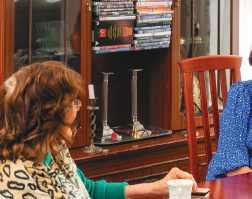


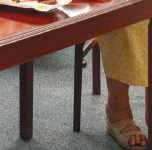

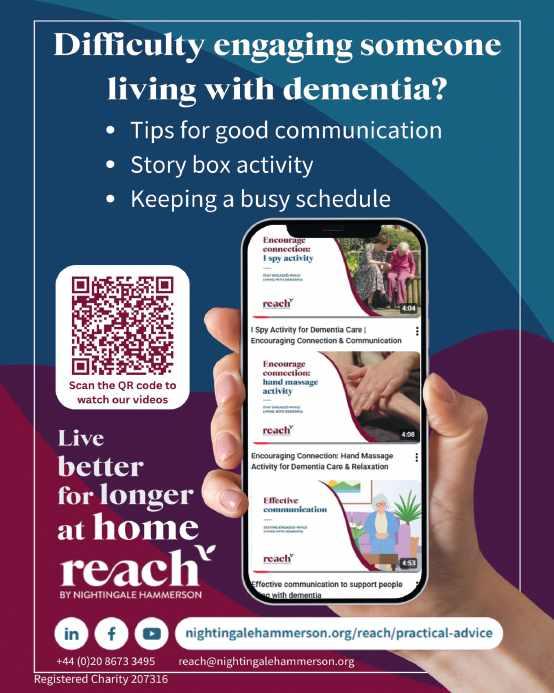

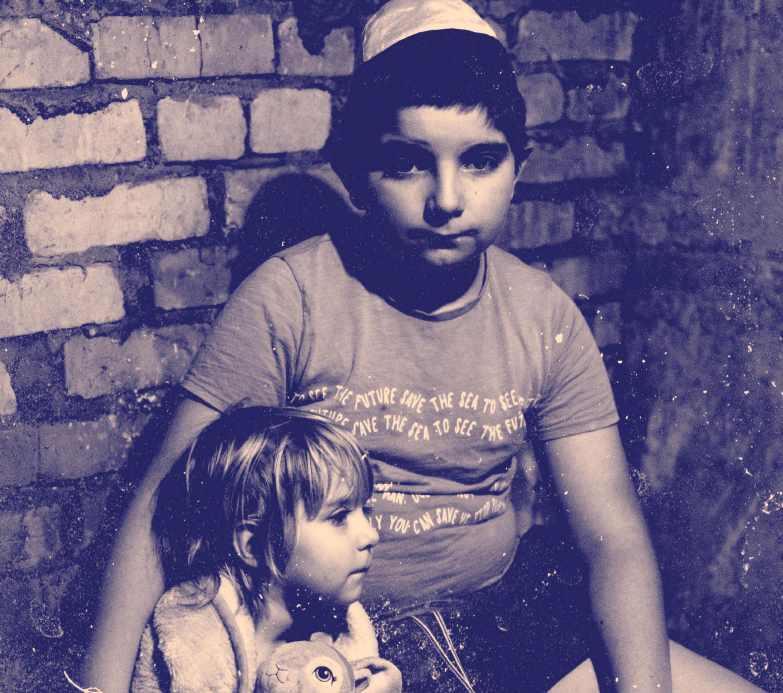













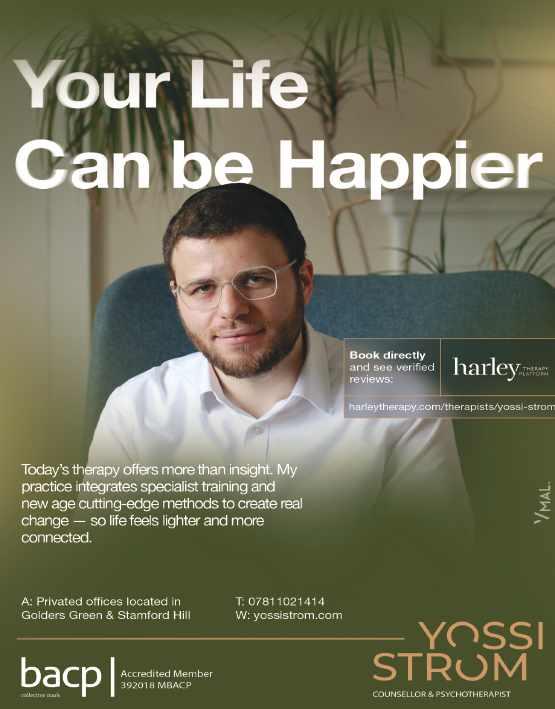

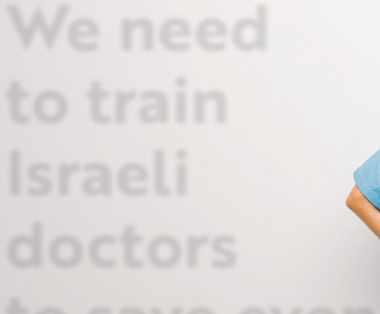







In response to the multipronged attacks on Israel over the past two years, Magen David Adom has launched the ‘Magen’ programme.
The initiative will train medical professionals living in isolated areas. These community-based medical units will provide an immediate emergency response in areas that are cutoff, under prolonged warfare or without external aid.
This is just one of the many ways Magen David Adom is responding now and preparing for the future.


Please donate now by visiting mdauk.org/magen or by scanning the QR code. Saving more lives in Israel depends on it.
British Jews considering aliyah this year are being urged to act quickly after Shivat Zion unveiled a new group programme that closes at the end of December.
The charity, the UK’s only aliyah support organisation recognised by Israel’s Ministry of Integration, has announced a fully-funded pilot scheme o ering “unprecedented” levels of guidance for families who make the move in 2025.
Limited to 12 families, the initiative is centred in the Carmay Hanadiv neighbourhood of Kiryat Malachi, a growing Anglo-friendly community within commuting distance of Tel Aviv and Jerusalem.
Participants will be supported by Shivat Zion’s team of experienced Olim advisers from the planning stage in the UK through the first year in Israel. Assistance will cover bureau-

cracy, housing, employment, schooling, banking and day-to-day integration. Families will also be provided with furnished accommodation at subsidised rates, free ulpan classes and community activities to ease the transition.
Chief executive Shraga Evers said: “Making aliyah is a major step, one that can leave people
feeling unsupported and alone. This pilot programme gives families a unique chance to move with like-minded people in a ready-made community so you feel settled from day one.”
The pilot scheme, Evers added, aims to “take the stress out of aliyah” by ensuring families arrive with both professional support and peer companionship.
Carmay Hanadiv has already attracted a sizeable English-speaking community, combining relatively a ordable housing with proximity to major cities and the coast. The 12 families accepted into the pilot will form a new core group while joining the existing network of Olim and Israelis.
Shivat Zion is urging interested families to apply quickly to secure one of the remaining places before the 31 December deadline.
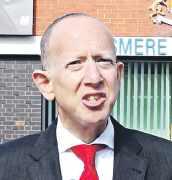
The Labour leader of Hertsmere Borough Council has apologised after he labelled those behind a campaign to raise the Union and St George’s Flags as a “bunch of criminals, extremists and nonces”, writes Lee Harpin.
Jeremy Newmark made the remarks at a full council meeting earlier this month after Conservative councillor Brett Rosehill accused him of attempting to “constantly
link our national flag to extremism”.
In a response that drew gasps of disapproval from his opponents, the former chief executive of the Jewish Leadership Council and ex-Jewish Labour Movement chair said: “I’m sorry, I’m not playing. I won’t be taking lectures on our national flag and extremism from a councillor who has the audacity to speak in almost glowing terms in his question to this council about Operation
Raise The Colours ... an organised and orchestrated attempt by a bunch of criminals, extremists, nonces … to hijack our national flag”.
Following a backlash, Newmark apologised for his remarks saying:
“I accept that some of the language I used was wrong and am sorry for that. I also accept that some people have ascribed a broader meaning to my words and am very sorry about that indeed.”
More than 1,500 people so far have pledged to take part in a central London demonstration in support of banned group Palestine Action.
The event, set for Trafalgar Square on Saturday, aims to be “the biggest ever mass action yet defying the ban on Palestine Action”, organisers Defend Our Juries say.
Hundreds of people are set to risk arrest at the protest as they showed support for Palestine Action, which has been banned by the Government as a terrorist organisation.
The organisers claimed that o cers were tied up for hours in dealing with protests earlier this week at the Labour Party conference, and warned: “If they can’t enforce the ban on their own doorstep, how do they expect to stop the biggest act of mass civil disobedience in Trafalgar Square this weekend?”
A spokesman said: “It’s nothing short of a scandal that thousands of people are being arrested – from vicars and priests to students and retired healthcare workers – as our fundamental rights to free speech and protest have been stripped away, not to keep us safe, but to protect weapons manufacturers’ interests and enable Israel to continue to slaughter Palestinian people.”
Saturday’s demonstration is part of a week of mass protests that has seen 66 people arrested outside the Labour Party conference in Liverpool for supporting the proscribed terrorism organisation. The Metropolitan Police has been contacted for comment.

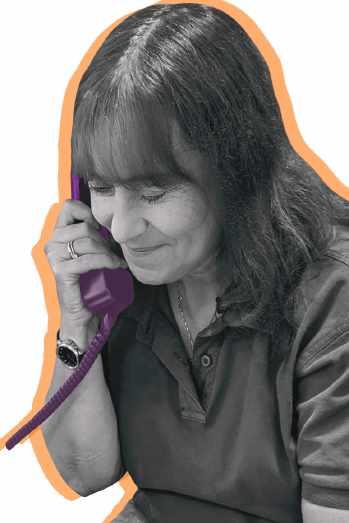

London’s young Jews are flocking to a new grassroots initiative that mixes sushi nights at Nobu with Friday night dinners and explanatory Rosh Hashanah services – and it’s already drawing queues out the door, writes Annabel Sinclair.
Spark, born out of Brondesbury Park Synagogue’s Young Professionals group, has quickly become what its founders call “London’s premier network of young Jewish professionals”. Its events now attract hundreds, with waiting lists filling days in advance.
“We completely sold out our last Nobu event a week early,” said organiser Johnny Rosen. “I spent the last few days politely telling people there were no tickets left. We could easily have had over 200 if we’d had the space.”
Rabbi Meir Levi explained the rebrand was about opening doors. “Brondesbury Park is our parent body and hugely supportive, but people were asking if they had to belong to the shul to come,” he said. “Spark makes it clear this is for everyone.”
The new name was coined during a Kilimanjaro expedition with 18 young professionals. “Spark represents energy, connection, and the

initial spark of inspiration,” Levi said. “We’re sparking friendship, spirituality, community.”
Both Levi and Rosen say the Hamas attacks in Israel were a turning point. “After 7 October everyone wanted to be more involved,” said Rosen. “London needed that Israeli spirit of openness – Friday night dinners where everyone’s welcome, even if you’re a friend of a friend. When no one else created it, we decided we would.”
For many, that atmosphere is transformative. “Someone told me after our last event: ‘I don’t feel like I’m in London right now – it feels like New York or Tel Aviv.’
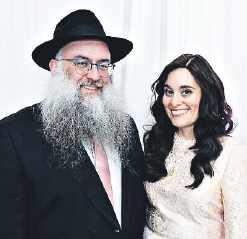
That was the biggest compliment we could get,” Rosen said.
Spark’s model is a “funnel”: big socials at the top, with space for people to move into smaller, more intimate Jewish experiences at their own pace. “You might come to Nobu having never been to shul,” said Levi. “Then you decide you want to try a Friday night dinner or join a learning event. It’s self-paced, no pressure.”
Events range from business networking and paddle tennis to explanatory prayer services. At last year’s Kol Nidrei, 200 young professionals filled a hall for a service.
The project is proudly youthled, with a growing team including co-organiser Jonah Blackburn, who handles much of the marketing and brings his wide social network to the table. “We wouldn’t be anything without the team,” Levi stressed. “It’s grassroots, not top-down.”
Spark’s rapid growth has been fuelled largely by word of mouth. “We’ve gone from zero to nearly 1,000 young Jewish professionals on our database in just over a year,” said Rosen. “When was the last time Jewish events sold out three days early?”
Challenges remain – especially


funding. ‘We’ve been bootstrapped until recently,” said Rosen. “One donor supports us monthly, but to scale we need more backing.”
The founders are already dreaming of Chanukah at Nobu, a Poland trip, even another expedition.
“This is who we are,” said Rosen. “We’re not afraid. “We’re proud.”
Yet the ambition is clear. “I want Spark to be a place where people feel they belong and can connect with their Judaism in a cool way,” Levi said. “It’s about relationships that last, not just big numbers.”
New West End Synagogue in central London’s Bayswater has elected Rabbi Aaron and Rebbetzin Miriam Lipsey as the community’s new rabbinic couple, filling a pulpit that has been vacant for several years.
The duo served the United Hebrew Congrega-
tion of Newcastle for the past 14 years, with Rabbi Lipsey also serving as a chaplain for universities in the north-east of the country.
In a joint statement, Rabbi and Rebbetzin Lipsey said: “We are humbled and excited by the opportunity to become part of the New West End
Synagogue family.
“We are inspired by the community’s rich history and welcoming spirit and look forward to building new memories, nurturing each individual’s journey, and creating a home where all can celebrate, learn, and grow in Jewish life.”
They added: “Leaving
the United Hebrew Congregation of Newcastle, a community that has given us so much love and inspiration, is bittersweet. We carry those treasured relationships and experiences with us as we begin this new chapter.”
Jeff Altman, chair of New West End Synagogue, said: “We looks for-
ward to welcoming Rabbi and Rebbetzin Lipsey in January 2026, as the community continues to strengthen its role as a centre of Jewish spirituality, learning and cultural vibrancy in Central London.”
The couple have five children and two grandchildren.







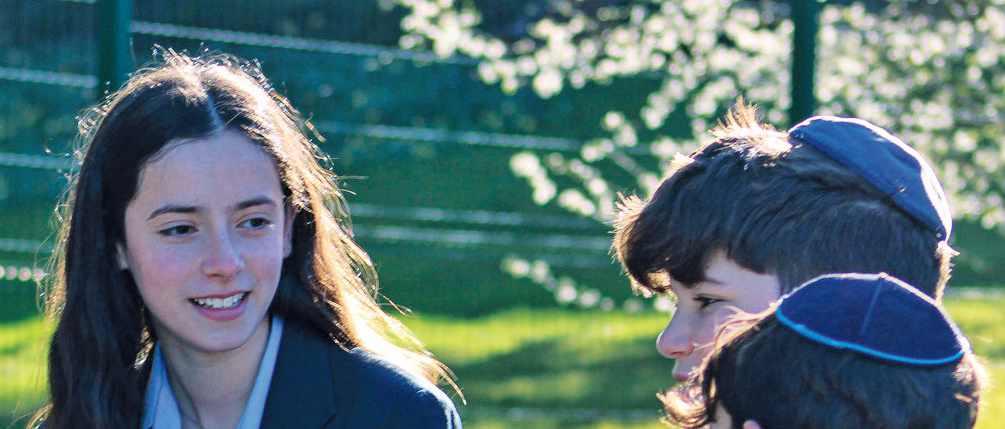



Is your school too big?
At Immanuel‚ it’s person al

Open Evening Wednesday 22 October 2025 • 5:15pm – 7:30pm

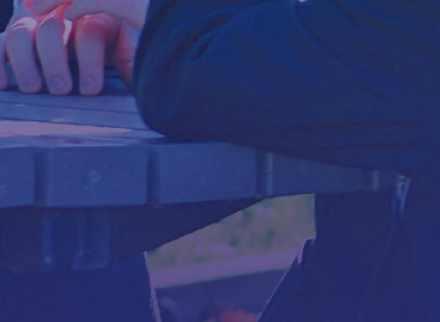
Small classes. Inspiring Jewish education. Exceptional pastoral care. A personalised approach where every child fl ourishes. Scholarships and bursaries available. Applications open for all year groups, including Year 6.
Sign up for our Open Evening and start your child’s journey
KIND | ASPIRATIONAL | RESPONSIBLE | CURIOUS



















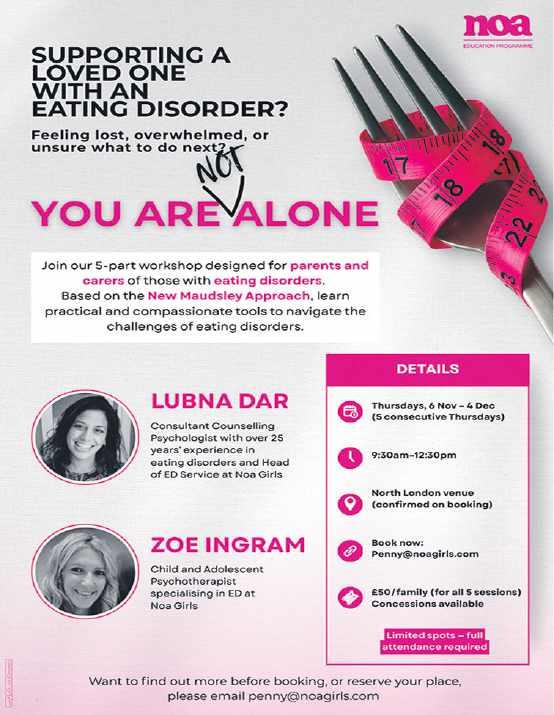

by Justin Cohen
It’s not often that a head teacher gets treated like a popstar by his former students. But that’s what happened last week when 98-year-old Denis Felsenstein returned to the school – Immanuel College – he helped launch 35 years ago.
The Bushey school’s founding head was among the 300 alumni, teachers and parents at the reunion event which mixed music, memories and mingling. After he recalled to loud applause how the school grew from just 40 pupils in 1990, he was surrounded by guests wanting to chat and later by ex-students requesting selfies as he prepared to leave with son Richard, himself a former deputy head at Immanuel.
magical quality. At its heart lies kindness, care, and a deeply personal approach. This was true when the school began with just 40 pupils –and it remains true today, with our Head still knowing nearly every student by name.”
The gathering featured musical entertainment from singer-songwriter and former head boy Bertie Green, fresh from his performance at Glastonbury, as well as a stunning rendition of One More Day from this year’s school production Les Miserables and a duet by Jacob and Talia of a song composed by Immanuel director of music Stephen Levey.

“Immanuel pupils have gone on to lead major educational institutions, become doctors, rabbis, entrepreneurs, lawyers, and philanthropists - true examples of tikkun olam: making the world a better place,” said chair of governors Daniel Levy. “Immanuel has a unique, almost
Master of ceremonies, Dov Forman, quizzed former heads Felsenstein (1990-1995), Philip Skelker (2000-12) and Gary Gri n (2017-2021), who recalled his first experience of the chaos of Purim and joked how none of his previous postings at non-Jewish schools prepared him for so many parents wanting to speak to him.
Forman – part of the class of 2022 – told the gathering: “In my year-group, more than 15 of us

went on to study in yeshiva and seminary, with many others spending a gap year in Israel. That was a direct consequence of the environment Immanuel created – one that instilled a love of Torah, of Israel and of being proudly Jewish. I can see how the lessons I learned here continue to stay with me far beyond the school gates.” A su erer of ADHD who joked about the number of detentions he received, he spoke about how the school helped channel his energies.
He credited his GCSE and A Level history teacher Mr Raine for encouraging him to start sharing his great-grandmother Lily Ebert’s
Holocaust testimony which went on to reach millions. “During lockdown, he encouraged me to use that di cult period to begin sharing the Holocaust testimony of my great-grandmother, That experience led me to write for Jewish News about Holocaust survivors adapting to the digital world and realise the responsibility I had to carry her testimony forward.”
Head Dan Endlar said: “What truly defines our school is the feeling you get when you walk through the gates. The sense of personal connection, where every pupil and every family matters.”
“My life changed overnight. After having my leg amputated, Jewish Blind & Disabled offered me the housing and support I needed to retain my independence.” Geoff, JBD Tenant
Jewish Blind & Disabled offers housing and support for adults who have physical disabilities or vision impairments.

To make a donation or to find out more about our housing and support, please visit jbd.org or call 020 8371 6611

Doctors Rahmeh Aladwan and Rehiana Ali have a lot in common. Both post regular diatribes claiming “Jewish supremacy” controls this country. Both have shared Nazi-grade conspiracy theories about Jews: one has tweeted, for example, “Rabbis need to reject the Amalek commandment and the notion that non-jews are lesser than goyim”, while the other has shared the claim, among many other things, that thousands of Jews didn’t go into work on 9/11. Both claim their vile rhetoric is somehow in support of the Palestinian people. And in the past few months – Ali in July, Aladwan last week – the Medical Practitioners Tribunal Service has decided both are fit to practice medicine while the General Medical Council (GMC) undertakes investigations into their conduct.
The MPTS itself lists examples where a doctor’s right to freedom of expression ends. These include “allegations that a doctor is promoting and/or spreading misinformation which has the potential to harm public health or undermine public confidence in the medical profession”.
One would think it would be exceedingly difficult to look at a comment from Aladwan stating they do not condemn Hamas or 7 October, or from Ali asking if Jewish News readers are human, and not reach the conclusion such doctors are seriously undermining public confidence in the medical profession. At the very least, one would expect the MPTS to understand a Jewish person would reasonably fear for his or her safety if unfortunate enough to be in either doctor’s care. Apparently not.
Last week, in response to the latest reporting on this scandal by Jewish News, Health Secretary Wes Streeting said frankly he did not have confidence in the UK’s medical regulation system and its ability to keep patients safe. He described how “the racist language of ‘Jewish supremacy’ reflects the values of Nazis, not the NHS”, and said he failed to see “how medics using such language with impunity don’t undermine confidence in the medical profession”.
His sentiments are shared by the British Jewish community and his condemnation is appreciated – but action is desperately required. In July, Streeting used similar tough language about the GMC “failing publicly and abysmally” on antisemitism – yet it appears little has changed.
The Health Secretary is not wrong. What Jewish News readers want to know is what he will do to put things right. He has now said he is taking “urgent advice on next steps”.
British Jews are waiting to hear what those next steps will be.
I would like to share with your readers my open letter to Keir Starmer.
Dear Prime Minister I have read your words explaining why you chose to recognise a Palestinian state. You write as a “friend and supporter of Israel”, yet here in Israel your decision is seen as emboldening terror and betraying its victims.
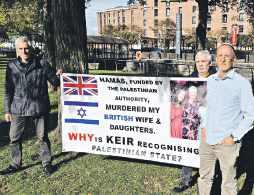
I’m a British citizen and for me it is personal: my wife Lucy and my daughters Maia and Rina were murdered in cold blood by Hamas terrorists from Nablus in April 2023. Since then, their killers’ families have received monthly salaries from President Mahmoud Abbas’s Palestinian Authority – financed under his “pay-for-slay” law that guarantees lifelong rewards to those who kill Jews.
This is not a theoretical debate about peace plans. Every month, Abbas signs the cheque that pays the families of the men who murdered my family. Britain has been funding the Palestinian Authority to the tune of tens of millions of pounds over the past decade.
That means that, while the killers of my wife and children – who were British citizens – are being paid salaries by Abbas, they
The Government’s move to formally recognise the State of Palestine is a disgrace to the memory of British servicemen who fought against terrorism in all its forms. In the Second World War, our soldiers gave their lives to defeat fascist tyranny.
Just two decades ago, another generation fought and fell in Afghanistan and Iraq, confronting Islamist extremism. To now recognise a state led by factions that sanction terrorism is a betrayal of those sacrifices. Nor can it be claimed this extremism is confined to leadership. According to the Palestinian Centre for Policy & Survey Research, two-thirds of Palestinians support the 7 October attacks. Eli Cohen, London

Thank you for helping to make Jewish News the leading source of news and opinion for the UK Jewish community. Unlike other Jewish media, we do not charge for content. That won’t change. Because we are charity-owned and free, we rely on advertising to cover our costs. This vital lifeline, which has dropped in recent years, has fallen further due to coronavirus.
Today we’re asking for your invaluable help to continue putting our community first in everything we do. For as little as £5 a month you can help sustain the vital work we do in celebrating and standing up for Jewish life in Britain.
Jewish News holds our community together and keeps us connected. Like a synagogue, it’s where people turn to feel part of something bigger. It also proudly shows the rest of Britain the vibrancy and rich culture of modern Jewish life.
You can make a quick and easy one-off or monthly contribution of £5, £10, £20 or any other sum you’re comfortable with. 100% of your donation will help us continue celebrating our community, in all its dynamic diversity.
Support Jewish News by visiting our donor page at jewishnews.co.uk
are effectively being financed by the British taxpayer. Meanwhile, no compensation, no acknowledgement and no justice has been offered to the British victims of those British-funded terrorists.
You say that recognition “rejects extremists who fantasise about Israel’s destruction”. But Prime Minister, these extremists are not fantasising –they are openly funded!
Abbas calls them martyrs. He celebrates them in textbooks, in television broadcasts and in public squares named after killers. By giving his Palestinian Authority a state, you are not weakening Hamas, but strengthening the ecosystem that supports Hamas terror. You ended your traditional Jewish new year message with a wish for a sweet new year. For my family, and for all Israelis, sweetness will come only when the world insists that Palestinian leaders stop financing murder and start preparing their people for peaceful coexistence.
Anything less is betrayal dressed up as diplomacy.
Rabbi Leo Dee, Israel
The decision to recognise a Palestinian state at this time undermines prospects for peace. Statehood has always been intended as the culmination of negotiations, not a reward handed out in their absence.
By recognising it unilaterally, Britain weakens moderates, emboldens extremists and removes incentives for compromise.
The message sent is that violence pays, while dialogue and reform do not. Far from advancing peace, this step entrenches division and delays the day Israelis and Palestinians can live securely side by side. Val McKaye, London

















‘No need to atone this year – the CPS got details of your sins to me outside the six-month time limit.’

JEREMY HAVARDI JOURNALIST AND AUTHOR
The 20-point plan for ending the war in Gaza, announced by President Trump at the White House, has the potential to be a transformative moment in the Middle East. It is quite simply the best hope of ending the conflict between Israel and Hamas and has the support of Arab governments across the region, some of whom may be willing to normalise relations with Israel. It is therefore right that Netanyahu embraced the plan, despite some opposition back home.
Having just completed his visit to the UK, he left a message to British Jewry: “We have your back”, presumably referring to the rise in antisemitism in the UK.
Netanyahu can say that the plan fulfils Israel’s basic war aims. It stipulates that Hamas can never again be in control of Gaza, as point 13 states the terror group and other factions “agree to not have any role in the governance”
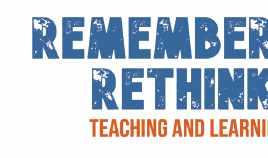
of the territory. It also provides for a demilitarised Gaza, given that the plan demands that “all military, terror and o ensive infrastructure, including tunnels and weapon production facilities, will be destroyed and not rebuilt”.
The demilitarisation will be supervised by independent monitors who will place weapons “permanently beyond use through an agreed process of decommissioning”.
Such language, like the document as a whole, bears the influence of Sir Tony Blair, a man whose experience of the Northern Ireland peace process has been so important.
Above all, it marks a contrast with previous rounds of the conflict between Israel and Hamas, which have left the terror group in charge of the enclave.
It ensures the hostages are allowed back home, including close to 20 that are believed to be alive. This represents a phasing-out of partial hostage releases, which were accompanied by ghoulish parades in front of crowds in Gaza.
Contrary to previous plans which demanded that the IDF withdraw fully from Gaza, this one will involve a staged withdrawal linked to demilitarisation.




The final stage of this allows Israel to have a bu er zone around the enclave and for Israel to remain in position until Gaza is “properly secure from any resurgent terror threat”.
Israel had decried the notion that Mahmoud Abbas could take over as the de facto ruler of Gaza, post Hamas.
The plan thus represents another win for Israel with its aim that instead of the Palestine Authority, a technocratic, apolitical Palestinian committee called the Gaza International Transition Authority (GITA) will take over once Hamas has gone.
This body, headed by President Trump, chaired by Blair and assisted by Arab and Muslim bodies, will build up Gaza’s capacity to run its a airs.
Sir Tony has been well chosen for his role in the GITA, given his extensive experience of the region and his deep connections with a large number of its leaders.
More importantly, the plan goes on to say there can be an eventual role for the Palestinian Authority in Gaza – a genuinely bitter pill for Israelis to swallow.
However, such rule will be dependent on
implementing a programme of reform, something that is essential given the extent to which the PA is ridden with corruption, incitement and terror.
Only when reforms have been implemented can there be a “credible pathway to Palestinian self-determination and statehood”, an aspiration rather than a time-bound commitment.
Some have already decried the absence of a “total victory” over Hamas in this agreement. To these people, one must ask a simple question: “What is the alternative?” Clearly, no agreement is ever perfect and will always involve compromise and adaptation.
This war always required a political roadmap to peace, rather than merely a military solution. Moreover, the political dividends here could be huge. Already, there is talk that some Muslim nations could normalise relations with Israel, Saudi Arabia and Indonesia among them.
So Netanyahu was right to embrace this deal on behalf of his country. The international community must now place its pressure where it truly belongs – on Hamas – to bring this war to an end and carve out a better future for Israelis and Palestinians alike.





PETER LERNER FORMER ISRAELI
When I hung up my uniform after 25 years in the Israel Defence Forces, I thought I was stepping away from the frontlines. What I didn’t expect was that the most decisive battles for Israel’s future would not be fought with tanks or drones but with collective bargaining agreements, strike actions and union organising.
As an IDF spokesperson, I spent decades explaining and defending Israel’s most painful and complex moments to the world. Today, I find myself in a di erent kind of struggle, no less vital, at the heart of Israel’s democratic, economic and social fabric.
I now serve as the international face of the Histadrut, engaging on behalf of Israel’s workers in the name of Israel’s largest and most influential trade union federation. And if you’re looking for real hope for a more equal, inclusive, and democratic Israel,
this is where you’ll find it. The question that keeps me up at night is this: Can Israel remain a democracy if millions of people feel abandoned by the state, shut out of opportunity and powerless at work?
In the army, we talked about deterrence and resilience. In the workplace, we talk about fairness and solidarity. But in the end, we’re wrestling with the same problem: how to hold a society together when it’s being pulled apart by fear, inequality and division. That’s where the Histadrut comes in.
Outside Israel, many still associate the Histadrut with its early roots – socialism, kibbutzim and Israel’s first prime minister, David Ben-Gurion. But the modern Histadrut is something else entirely. It is digital, dynamic and deeply diverse.
We represent around 26 percent of the workforce – just above the UK, nearly a million workers from all Israeli society: Jewish and Arab, secular and religious, urban and rural, high-tech and transport.
We’ve organised both young freelancers and veteran bus drivers. We’ve negotiated pay raises for nurses and launched union
drives in call centres and insurance firms, work driven not by ideology, but by dignity. Take, for example, our historic agreement with Egged, Israel’s largest public transport cooperative. For the first time, workers will receive a share of company profits of 50m NIS (£10.45m) over four years. That’s not just a wage boost but economic democracy in action. Across the board, we were building structures that give working people voice and agency. And then came 7 October.
While the world saw rockets, terror and mobilisation, inside Israel something else unfolded: solidarity, as 12 percent of the workforce disappeared overnight, 300,000 reservists were called up and 100,000 Palestinians were banned from working in Israel.
As reservists were called up, the Histadrut moved quickly to protect their rights, fighting to secure their jobs, pay and benefits. We opened emergency response centres for workers displaced from the south and north. We launched aid operations, legal support and financial protections for those who suddenly found themselves without homes, incomes or stability.
To get the best value from your private medical insurance, you should speak to an expert who is qualified to advise you on the right policy for you, and recommend the providers who offer the most competitive premiums.
This advice covers individual, family and company policies, and is always FREE.
As an independent health insurance expert, I work with the healthcare insurers to provide you with the appropriate and most affordable level of cover. So whether you have an existing policy or not, let’s have a chat.
contact me at
3146 3444 or 07956 244350 trevor.gee@patienthealth.co.uk

It’s easy to talk about “resilience” in military terms. It’s harder, but equally essential, to deliver it in the civilian sphere. And that’s what we do. Because solidarity isn’t just a wartime slogan, it’s our daily mission.
What surprises many is that the Histadrut may now be Israel’s most e ective platform for shared society.
While political discourse grows toxic, we bring Jewish and Arab workers together around the bargaining table. We employ Arabic-speaking organisers. We foster mixed communities in the workplace, sports fields and educational programmes.
Why? Because economic justice builds trust and trust is a security asset, too.
After years of briefing the world on Israel’s wars, I didn’t expect to feel just as proud representing the frontline workers in day-care centres, factories, hospitals and schools. But I do.
Because this – the bargaining table, the union hall, the shared struggle for dignity – is where Israel’s future is being decided. And we’re building that future, one worker at a time.


AMJAD TAHA POLITICAL STRATEGIST & ANALYST FROM THE UAE
In 2020, when the Abraham Accords were signed, many people looked at it and saw what they thought would be a temporary, fragile pact, easily swept away by the winds of conflict. Instead, it has become the single most resilient bridge of diplomacy in a region where bridges are often burned. In a time of darkness, when terror struck on 7 October, the accords stood as an anchor reminding the world that peace, once born, does not surrender easily.
People understood the meaning of travel when skies were closing. When members of Congress in Washington or parliamentarians in Canberra could not find flights to Israel, when airlines suspended services, FlyDubai never stopped. It carried passengers across closed skies, o ering not just transport but a lifeline of truth. In February 2025 alone, more than 1,083,000 international passengers
moved through Ben Gurion Airport, a rise of 55 percent on the previous year. Nearly 99,000 of them traveled between Dubai and Tel Aviv – an air corridor of resilience.
People follow the money as much as the skies. Trade between the UAE and Israel, once nonexistent, reached six billion dollars between 2021 and 2024. With the Comprehensive Economic Partnership Agreement, the goal is clear: 10 billion dollars in bilateral trade within five years. For the UAE, that means almost two billion dollars added to its GDP by 2030. For Israel, it means access to capital, technology, and markets once unimaginable.
For both, it signals a future tied not by slogans but by supply chains.
People also know peace has enemies. Islamist movements Hamas in Gaza, the Muslim Brotherhood networks in Sudan, Hezbollah and al-Qaeda operatives on the Red Sea are working to sabotage the train of accords. Port Sudan, still hostage to a Brotherhood-led army, has become a hub for weapons, drugs and terror finance. Captagon shipments are routed through its docks, seizures in recent years have confirmed Sudan as a growing transit point for
the narcotic, with chemical precursors entering through porous borders. Hezbollah facilitators and al-Qaeda cells use the same routes, working with Houthi allies across the Red Sea. What should be a port of trade is now a theatre of terror. For many in the region, Port Sudan has earned a new name: the Hamas of Africa.
People are not blind to this danger. The United States has already named Sudan’s minister of economy and senior army figures as directly tied to Iran and terrorist networks.
Washington warned that instability there is being manufactured, not accidental, and driven by alliances with Islamist actors who profit from war. The picture is stark: Sudan’s economy and ports risk being repurposed as staging grounds for drugs, weapons, and the planning of atrocities. This is where the next 7 October could be seeded – not in shadows, but in plain sight. What extremists hoped would derail the accords has exposed the scale of the threat and strengthened the resolve to confront it.
People know every challenge forces the project forward. In 2026, expansion will define the accords. More states, from the Middle East to Asia, are expected to join. Early talks are
already surfacing in UN corridors, with Syria quietly placed on the horizon for 2025. What began with the UAE, Bahrain, Morocco, and Israel will not remain confined, it will spread.
People in Gaza already saw the results. Because of the accords, the UAE was able to coordinate directly with Israel and open humanitarian channels that would otherwise have been far more challenging. Nearly 50,000 tonnes of relief have been delivered. Over a thousand patients, many of them children with cancer, have already been airlifted to Abu Dhabi for treatment, and the number continues to rise. Power generators were sent to restore electricity to medical centres, while humanitarian corridors carried blankets, tents, and emergency equipment. All of this was possible because the accords created the trust needed to act quickly and at scale.
People ask if optimism is naïve. The truth is sharper: optimism is strategy. The accords are not a candle in the storm, they are the storm that sweeps away despair. And perhaps, with a smile, one day the busiest checkpoints in the region will be the ones guarding queues for trade expos and concerts, not borders of war.







MUST END 11 OCTOBER
EXTRA MATINEE ADDED ON 4TH OCTOBER

“A
DANGEROUSLY EROTIC PRODUCTION, DIDENKO’S SALOMÉ DAZZLES” BROADWAY WORLD


“BEAUTIFULLY STYLISED AND ATMOSPHERIC” THE SPY IN THE STALLS

It is our duty to remind them, and ourselves, of the horrors of that day.
It is now two years since 7 October 2023 – a day of tragedy, heartbreak, unspeakable violence and suffering for Israel. It was also a day which shook the foundations of Jewish life here in the UK and all over the world.
This Sunday we will gather in London, at an event organised across the whole Jewish community, to remember those who were murdered, the families which were torn apart and the hostages taken from their homes to Gaza on that fateful day and who remain in Hamas captivity more than 700 days later. It was a day when we were jolted by the cruelty and inhumanity of the acts perpetrated but also a day when incredible acts of heroism and staggering bravery were undertaken by people who were prepared to risk their lives to save others. Many throughout our country and across the world seem to have forgotten the events of 7 October.
This Sunday, we will hear from those directly a ected by the murderous Hamas attacks on peaceful communities waking up to celebrate the festival of Shemini Atzeret.
The speakers at Sunday’s event will include former hostages, family members of hostages and a survivor of the Nova Festival massacre.
In the days and weeks following the attacks, life changed for us here in the UK.
Suddenly, Jewish schoolchildren faced abuse on their way to class, gra ti was scrawled on communal buildings, families felt unsafe in their own neighbourhoods, and synagogues were forced to heighten their security.
However, resilience is part of the Jewish DNA. We have coped with antisemitism before and the Jewish community in the UK has shown incredible strength and spirit in standing up to the haters and also reaching out to Israelis and others who su ered terrible loss on 7 October .
We will light candles for those who died and those who are still missing and we will pray for peace. The enduring tragedy of 7
October and the subsequent conflict has claimed thousands of innocent lives on both sides. We all long for the su ering and the starvation to end and for reconciliation between Israelis and Palestinians. This starts with the release of all the hostages, the massive flow of aid into Gaza, and the end of Hamas’s reign of terror in the enclave.
After all this su ering, it is time for concerted e orts towards lasting peace and security for Israelis, Palestinians and the wider Middle East
This Sunday, we will gather as we did last year, to remember the victims, to honour the survivors, to thank the heroes.

It will be a solemn day. But it will also be a statement of defiance and hope. Terror will not define us. Hatred will not diminish us. We will stand together and look forward to a better future.
We would like as many of you as possible to join us to show the strength and the solidarity of our community. You can find more details about the event at bod.org.uk/bodnews/two-years-since-oct-7
More information about the location and speakers will be available closer to the day.
















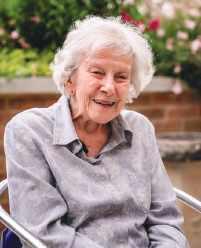







Journalist and author Brendan O’Neill was guest of honour as KKL, JNF UK’s legacy department, hosted 85 members of the community at a New Year high tea at Hendon United Synagogue. O’Neill spoke of world reaction to 7 October, saying: “We are living through one of most profound moral inversions of modern times. What Israel has done over the past 18 months should be inspiring to the whole Western world, because it is a nation that is willing to defend itself, protect its borders, stand up for its history and its traditions and defend its people from foreign elements that would like to kill them.”
Tesco celebrated the Jewish new year with a bespoke decorated home delivery van from its Borehamwood Extra store with the words ‘Happy Rosh Hashanah, Shana Tova’ on the side and rear panels and graphics of traditional apples, pomegranates and honey. Tesco’s regulatory, ethics and compliance legal director and member of the New North London Synagogue in Finchley David Ward said: “We know how important Rosh Hashanah is to our customers, so it’s great to be able to showcase some of the key symbols of the time of year.”
The United Synagogue marked the completion of its Ma’aleh women’s learning programme with a celebration at South Hampstead Synagogue. The two-year journey in advanced Torah study, in conjunction with the office of the Chief Rabbi, was led by the shul’s Rebbetzen Lauren Levin, together with Rabbanit Shani Taragin, a renowned teacher at multiple education institutions in Israel. Levin said: “Ma’aleh started on 10 October 2023, in the ‘shadow of death’ of the 7 October massacre and became our ‘tree of life’ and strength over the following two turbulent years.”
More than 400 attendees met for the 20th anniversary Norwood Distressed Investing Dinner at the Dorchester Hotel in London, raising £590,000 for the charity. Committee members introduced Hannah, mother of teenage Jacob, who is supported by Norwood’s Unity short-breaks schemes, who said: “Navigating this path alone is not possible; we rely on our family, friends, his dedicated teachers, and, importantly, the support we receive from Norwood.”
Almost two dozen determined participants laced up their trainers and set off from Maidenhead to Windsor for The Giant Walk, a full 42km marathondistance challenge in support of Myisrael. Ranging in age from 11 to 70, participants took on the full marathon or a 21 km half-marathon, trekking along the Thames with a midway stop at historic Runnymede. With 300 donors supporting the challenge, more than £35,000 was raised for Israel-focused projects including trauma therapy, support for families in crisis as well as vital support for homeless people, troubled teens, isolated elderly people and Holocaust survivors.
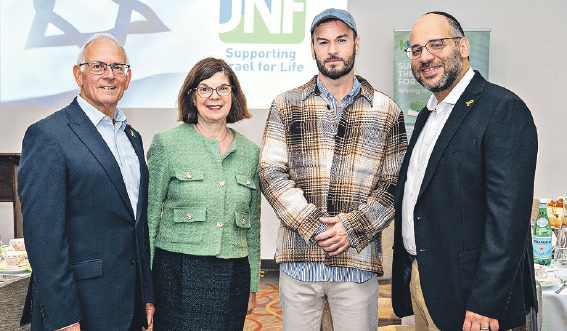


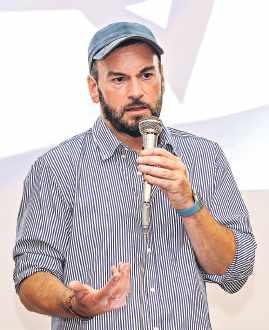

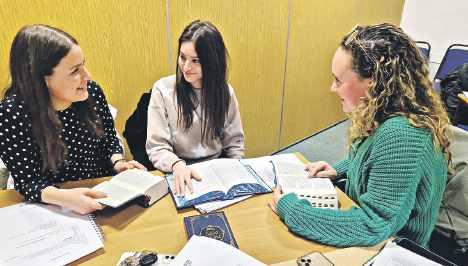

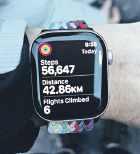








Bar & Batmitzvah





11AM to 4PM SUNDAY 2025 NOV 30
610 The Avenue @ Village London Watford Centennial Park, Elstree, WD6 3SZ



Anna Ziegler tells Anthea Gerrie why growing up in Brooklyn inspired her to write The Wanderers, opening in London this month
For the second time this year, arranged Jewish marriage looms large in a London play – although unlike Tzeitl in Fiddler on the Roof, the principals of The Wanderers don’t defy the shidduch-makers. Not just one couple but two submit to nuptials ordained by their elders, their lives ingeniously stitched together by award-winning playwright Anna Ziegler.
Growing up in Brooklyn inspired the story of the Chasidic pair, who must deal with the challenge feminism poses to traditional values in changing times.
“I’ve been fascinated for years by Jewish communities living near me but pursuing very different lives,” says the New Yorker, whose drama investigating what we expect of a life partner opens at the Marylebone Theatre this month.
And indeed Esther, the bride of conservative Schmuli, inspired by a radical friend to seize control of her life, seems typical of the Big Apple’s new wave of ultraOrthodox Jews whose women have dared to disrupt the old order.
Not that Ziegler, whose family are Reform, is drawing on personal experience.
She grew up with parents who are “fairly secular, High Holiday Jews, although I did have a bat mitzvah”. But her mother clearly feels a deep spiritual connection to the faith: “She was not raised religious but always felt very attached to Judaism and had a bat mitzvah as an adult.
“It was her attachment to Judaism which kept our family attached and wanting to be part of our community.
“That transferred to me, and I
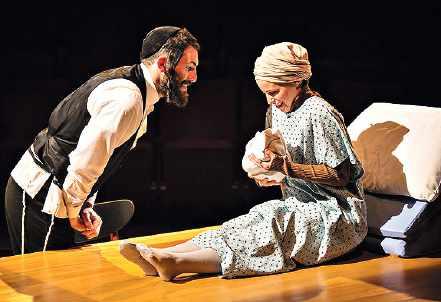
now have two kids who are going to Hebrew school,”
Ziegler intermarried herself, perhaps inspiring the contemporary bride in The Wanderers, who is Jewish but bi-racial. “When her husband, the central character, has his dalliance with a shiksa, the contrast with his wife is even more extreme,” Ziegler explains.
But although discontent with the realities of the hand one has allowed oneself to be dealt is a central theme of The Wanderers, it was not why Ziegler decided to explore arranged marriage.
“It started when I became fascinated by how different the traditions and rhythms of Chasidic life are from those of others in modern times,” she says.
“But my interest in the play was to show all our lives are governed by many of the same challenges, heartaches and frustrations. The title is more about the notion of the wandering Jew – a kind of restlessness which means never being quite content, an inability to be happy with what you have.”
This is even truer of Abe, the central character living in the present, than Esther and Schmuli, who reflect on the losses brought by their divergent paths. Abe and his own wife Sophie, brought up from childhood to consider each other their bashert, question whether it is even a valid concept.
Although her highest-profile plays have had Jewish subjects, Ziegler says she has not experienced any overt antisemitism in the US as a Jewish creative in
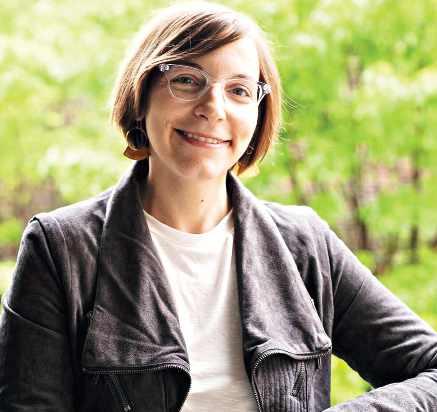
Author Anna Ziegler
the past two years. That is not to say she denies it exists. “There may be less Jewish writing being programmed, though it’s hard to know. It does feel like you have to be very careful what you say and who to you talk to – it’s a very delicate time to be Jewish in the arts. Not a moment when we can speak freely, which is a shame.”
The Wanderers, produced in New York before 7 October and staged across the US, does not seem to have been affected by a changing political climate in America and nor does Ziegler expect it to be in London: “This play is not political or about the Middle East; I hope it will be seen as a play about people struggling with their family and heritage and identity.”
She admits, though, that Actually, another of her award-winning plays, hit home a little harder as a campus drama about a Jewish student who brings a claim for sexual misconduct.
“My husband is a lawyer at NYU who oversaw a lot of those sexual misconduct cases, and in the past two years has been overseeing all the cases around antisemitism. So we have been deeply enmeshed at home in conversations about what is happening around the Middle East and Jewish issues on campus.
“It’s fascinating and difficult; my personal opinion is antisemitism exists, though it’s been a much bigger issue at Columbia than at NYU, as a result of which all the colleges have had to be on alert.”
Following mostly positive reviews for The Wanderers,
which won the San Diego Critics’ Circle award for Best New Play, producers have spent a couple of years seeking for a home for the show in London, where Ziegler’s Photograph 51, starring Nicole Kidman, picked up its own prize in 2015. So the poet and playwright, who has had a few plays on in the capital, knows British audiences are pickier than American ones infamous for a tendency towards endless standing ovations.
“There’s a different sense of humour in the UK, and audiences get ahead of the play a little faster; there’s a different quality of listening,” Ziegler says. “And there’s a bit more interest and tolerance in the UK for more experimental theatre.”
While she found time to come to London for rehearsals and is planning to be back for the opening following a return to New York to celebrate the chagim with her family, Ziegler is much in demand at home. She has a new play, an adaptation of Antigone, opening off-Broadway this winter, and a movie adaptation of Photograph 51 shooting in 2026. She has also written her first TV pilot – about the ripple effect in a group of mothers when one disappears.
Another wandering Jew on the run? “Go, Team is also about restlessness in a way, but I don’t think any of these women are Jewish – at least not so far.”
• The Wanderers is at Marylebone Theatre from 17 October to 29 November marylebonetheatre.com
It’s never too late to forgive, says the daughter who was criticised and shouted at for most of her life. By Anthea Gerrie
It took Gayle Kirschenbaum until middle age to forgive the mother who made her childhood hell to the extent she wished her dead. But it took the ever-carping matriarch until she was nearly 100 to forgive herself. “She was 99 before she acknowledged what she had done to me,” says the Emmywinning film-maker, whose chronicle of family abuse first aired at the UK Jewish Film Festival in 2015.
And as Mildred Kirschenbaum lives on, she continues to surprise the daughter who has put her professional life on hold to become her carer while detailing in print her journey from victim to ultimate forgiver.
As we chat about her just-released memoir Bullied to Besties , Gayle reveals she has extended that forgiveness to the brothers she calls her mother’s “enforcers”, as well as to the Mommie Dearest still trying to call the shots at 102.
“Today was so poignant because I saw her well up as I described how ill what she did to me had made me,” says Gayle over Zoom from Florida, where she has been finalising plans to celebrate Mildred’s big day. “She’s always been defensive and never normally expresses her emotions; it was the most open and vulnerable I have ever seen her.”
But Mildred will doubtless crack a smile

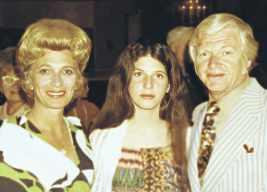
for the camera as she blows out the candles on her cake. Birthday plans include a sponsored kiddush at Palm Beach Synagogue to be followed by a bash at Mildred’s favourite bar in Boca Raton, where she lived independently until a few years ago. Then one fall too many prompted Gayle to up sticks in New York and move in with the mother she once couldn’t wait to get away from.
Gayle was born in 1954, the last of three children. “She only today admitted for the first time that she was depressed after I was born,” she says. “I can’t help but wonder if it was because she was expecting and hoping for another boy.”
In the event, she was tolerated but criticised and shouted at, warned not to expect

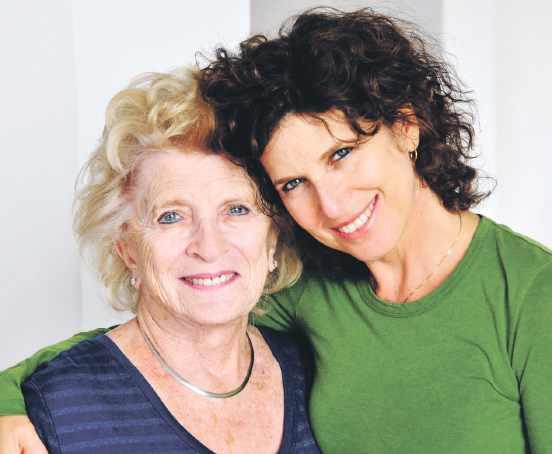
to be the little princess of the family. She lays this out even more vividly in her book than her film, Look At Us Now, Mother! “I wasn’t a daughter. I was an object – something to control, punish, dismiss. I was only seen when it served a purpose.” Unsurprisingly, Gayle wanted out: “Anything but living under the same roof as my mother and her obedient bouncers, my brothers.”
She comforted herself by dreaming of a world without Mildred: “When she went away with my father, I thought if the plane crashed I would be free.
“The criticisms, the humiliation, the mind games - they stretched across decades. I carried them with me into every room I entered, into every relationship and into adulthood.”
Riddled with headaches, dizzy spells and an eating disorder – “when you’re in a constant state of fear, everything goes into your body” – and still fighting skin problems, Gayle, like her mother still a beauty in her 70s, never married.
But she did yearn for closure, which first became a distant possibility when a newly-widowed Mildred surprised Gayle by asking to travel with her to a film festival. Surviving their first ever solo trip together, the daughter felt inspired to investigate and document the relationship which had caused her a lifetime of pain.
It began with My Nose, a short film about Mildred’s lifelong nagging of Gayle to get a nose job (she never gave in). One reviewer’s brutal comments about Mildred’s relentless bullying delighted, rather than devastated, the unashamedly narcissistic mother. “Bad press is better than no press – I’m on the cover of The Washington Post,” she announced triumphantly.
Capitalising on her mother’s penchant for attention, Gayle persuaded Mildred to join her in therapy for public consumption on film, and after many years of tweaking out family secrets only reluctantly given up, the result was Look At Us Now, Mother! A private screening, which got a
standing ovation, prompted Mildred, who had never asked to see the film ahead of time, to wisecrack to the audience: “I never knew I was such a bitch!” Even Robert, the surviving brother who now joins Gayle and Mildred on an annual birthday cruise, had tears in his eyes as he told his sister: “I realised that you couldn’t do anything right and I couldn’t do anything wrong.”
The years of working on their relationship with more than one therapist transformed Gayle into a forgiveness coach who has run workshops in many different cities for other daughters of difficult mothers.
Women from wildly diverse cultures have come up to her after screenings to tell her how much they relate to her story. And she has made Mildred an influencer by putting her in front of a phone camera to tell how she handles life as a centenarian.
Now Gayle is dealing with a new dynamic; she sees the increasing frailty of a tough old mother turning her into the one who loses patience the way Mildred did with her when they first started going to the gym together. “Dressed in her workout clothes, she shouted ‘you’re slow as shit!’ as I struggled to keep up,” she recalls.
“She wore everyone down with her relentless energy, but now the woman who once yanked others forward has slowed to the point where each button, each step, each breath takes e ort. And then I hear myself, her voice echoed in mine: ‘Stand up straight, Mother! Pinch your shoulder blades together.’ It comes out like a drill sergeant’s bark – so familiar it startles me.”
contemplates with dread life beyond the


“Watching her fade has been
“Forgiveness, which gave me to reclaim the part of myself I had hidden away, is what makes it
As the daughter who left home at 16 contemplates with dread life beyond the loving relationship she never imagined possible, she admits: “Watching her fade has been hard. Caring for her has been harder – but strangely healing. “Forgiveness, which gave me back my mother and allowed me to reclaim the part of myself I had hidden away, is what makes it possible. Without it I couldn’t sit beside her with tenderness now.”
Bullied to Besties is available on Amazon


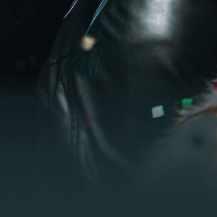




•
•
•
•
•
ROSH HASHANAH 2025
23,000
6,000+
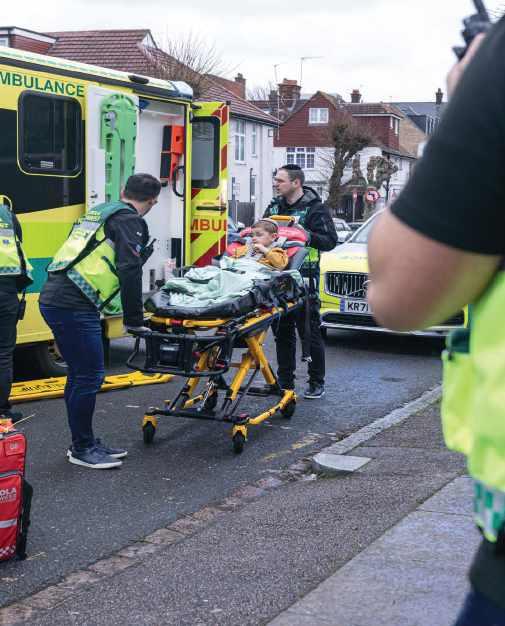













When I scheduled a Zoom interview with a photojournalist who has compiled a collection of hard-hitting images chronicling the year since 7 October, I wasn’t expecting my screen to light up with the face of a young, bubbly woman. And yet Chen Schimmel is the antithesis of the work she produces, which is dark, grave and di cult to look at. But look at it we must, for it is the most remarkable storytelling of that dark day back in 2023 and the year after.
Schimmel, 26, was born in London to a British father and a Swiss mother, but the family (she has five brothers) made aliyah after she finished school. Photography was a passion and when she was young she would take candid ‘street’ photos.

Louisa Walters
In 2010, there was an earthquake in Haiti and Schimmel’s parents went to help. When they came home and Schimmel saw photographs of the devastation “something within me knew that when I was old enough I needed to help in my own way, which would be in photography”.
An earthquake in Marrakech in September 2023 saw her fly to Morocco to photograph what she found. Her images were picked up by an agency in Israel which then asked her to freelance. “A month later was 7 October. I knew that I had to document what had happened and what was still happening –it’s the history of our people,” she says.
Schimmel and her family were at her parents’ house in Jerusalem for the chagim, and everyone sprang into action. “My brothers brought in clothes from England for those who were evacuated, my mum helped injured soldiers and my father volunteered with ZAKA (chevra kadisha).

“I remember him coming back after the first time he went, with a look of deep sorrow from what he had seen and done. I asked him if I
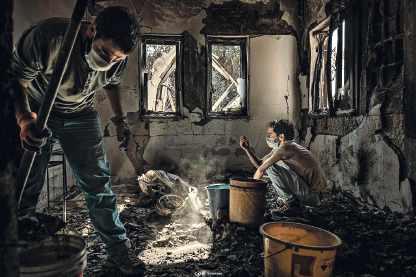


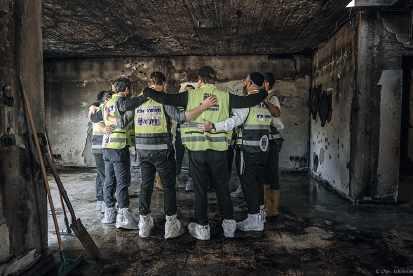
could join the next time because even if you had a press pass, everything was blocked o .” She joined ZAKA a few times to photograph the group’s work and then began documenting everything else that was happening in the country.
“So it was hostage families, Nova survivors, injured soldiers, displaced communities, reservists inside Gaza, the Lebanon border. In the beginning, I was freelancing, just for me, for pure documentation, to have a
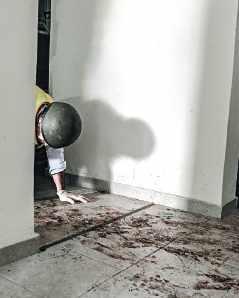
record so that no one could ever deny what had happened. But then the images were picked up by The Jerusalem Post
“They asked if I would freelance for them, documenting the hope that was starting to stir in the country. But I said ‘no – there’s something far more important right now, and that is the hostage families’.” Shortly after, she joined the Post as a full-time photojournalist.
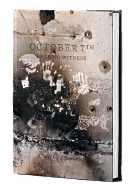
For the past two years, Schimmel’s work has been focused on the war. Her astonishing book, October 7th - Bearing Witness, is a project in conjunction with the Post but she has been given free rein over the content.
“It was hard choosing which images to use but I really just want the best of the best, and at the end of the day I want to tell a story,” she says.
The book has one just photo per page “to give them space to breathe, to allow the reader to take them in as they are”, she explains. “There are also testimonies, letters and memorials plus an introduction by President Herzog, Michal Herzog and Natan Sharansky, but no page titles or sections – I really want the viewer to just feel the transition and
understand the chronological order of events.”
At just 26 years old, Schimmel has won a Local Testimony Photograph of the Year award and produced a highlyimportant photographic compendium of the most devastating attack on the Jews since the Holocaust. Where does she go from here?
“I will just continue doing what I’m doing. But this book is the most meaningful, important thing and I truly believe it should be in every Jewish home. I also want people to buy it because so many, especially those outside of Israel, want to do their part to help. Having this book will prove that these events can never be denied – this is our truth.”
• October 7th – Bearing Witness is available in Hebrew and English and all proceeds from sales are donated to the Summit Institute’s Dror program which provides psychological, emotional, social and professional rehabilitation for IDF veterans coping with posttraumatic stress disorder. Order at chengschimmel.com £40


By Candice Krieger candicekrieger@googlemail.com


Israeli entrepreneurs are at the heart of a revolution pushing the real estate business towards a fast-moving future, writes Candice Krieger
it’s robot-driven warehouses, AI powering investment decisions or computer vision to make construction more e cient, a wave of technology firms are reshaping the property landscape.
The real estate industry is undergoing a long-overdue digital awakening – and at the heart of the shift is a group of Israeli-founded PropTech companies quietly setting the pace for global change. PropTech is the application of technology and digital solutions to enhance and streamline processes within the industry.
Israeli entrepreneurs are powering solutions adopted by major developers, property managers and institutional investors worldwide. Among them are Buildots, an AI-powered ‘mission control room’ to tackle ine ciency in construction, predictive analytics firm Caps for Sale and Home Made, which uses digital tools to o er landlords and tenants a streamlined, tech-enabled rental experience.
Ely Razin, chief strategic investments o cer at leading global venture capital fund OurCrowd, says for Israeli entrepreneurs PropTech is “a marriage of two loves. Israelis love to invest in real estate, both in Israel and abroad ,and this drives a deep understanding of what PropTech needs. Then Israel’s other passion - tech businesses - kicks in to bring great innovation to these markets worldwide.”
Razin notes Israeli PropTech is particularly strong in the areas of AI and fintech. “On the AI side, it enables smarter decisions that help make or save money, AI-powered decisioning around real estate investing and AI-powered construction tech that reduces costly errors.
“On the fintech side, Israel shines in payment processing and fund management, handling loads of investors with complex capital stack and massive amounts of money flow from tenants to landlords.”
Founded in 2018 by software engineers Roy Danon, Yakir Sudry and Aviv Leibovici, who at the time knew “very little” about construction. Their ambition was to create a ‘mission control room’ for construction projects, tackling inefficiency within an industry the founders say is “at a tipping point”. Buildots helps organisations eliminate avoidable construction delays by up to 50 percent on major projects.
The company’s core o ering is a performance-driven construction management platform powered by AI and computer vision. The technology automatically tracks and analyses construction progress by processing images captured from 360-degree hardhat-mounted cameras (and other sources) and comparing them to a project’s 3D model and schedule.
The outputs are actionable insights that give project teams, managers and project owners an accurate understanding of where the project stands and where it is heading, so they can focus their attention where needed.
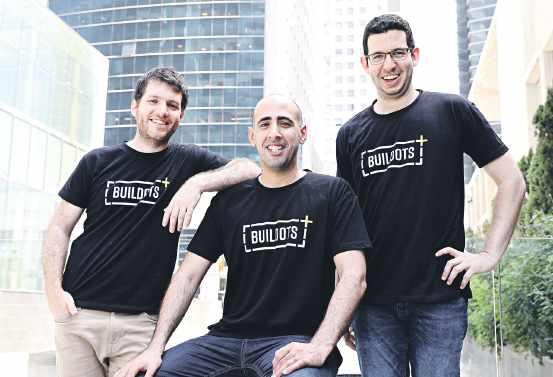
Buildots’ European HQ is in London. The company also has o ces in Tel Aviv and Chicago, as well as a presence in France and Germany. The platform is currently being used on large-scale residential and commercial developments, as well as hospitals, data centres, battery plants and even semiconductor fabs.
One of the longest-standing global clientsturned-investors is Intel, which uses Buildots to deliver its global semiconductor fab construction programme. UK clients include Wates, Sir Robert McAlpine, Kier, Multiplex and IHP.
Investment to date: $166m, funded by, among others, Lightspeed, Viola, Qumra Capital, Intel Capital, TLV Partners, Future Energy Ventures, OG Venture Partners and MAOR Investments.
What is the biggest challenge facing the property industry?
London-based Aviv Leibovici, co-founder and chief product o cer (CPO) of Buildots, says: “The construction industry faces numerous challenges, including supply chain disruptions, labour shortages, and the increased complexity of large-scale projects, such as data centres, which are becoming increasingly central to the global economy.
“All of these factors have driven a surge in demand for more e cient construction practices, which is precisely what Buildots delivers.”
What challenges have you faced scaling in a traditionally slow-moving industry like real estate?
“When we founded Buildots, many viewed our vision as futuristic. Today, it’s becoming the new standard for how contractors and owners approach construction management. People outside the industry often perceive construction as stagnant. However, the pace of change is accelerating – from the widespread adoption of
BIM and the use of drones and LiDAR scanning on construction sites, to the application of advanced processes inspired by agile methodologies from software engineering.
“However, optimising the execution phase – the actual building – remains rather manual and data-poor. And that’s where Buildots is driving real change. We’re bringing objective data into the heart of day-to-day construction process management. And while there has been some resistance to change, a surprising number of people instinctively see the value.”
How do you see your role in the broader digital transformation of the property sector?
“We’re at the centre of it! Historically, construction has been managed quite reactively. You discover a problem, then you fix it. We’re building predictive capabilities that fundamentally change this paradigm, anticipating the cascading e ects of delays before they happen, allowing teams to prioritise
interventions based on projected impact rather than just current status. Being able to do that on one project is significant, and across multiple projects is transformative.
We see our role as enabling stakeholders from all levels to work and make informed decisions based on the same, objective dataset.
“This is why we’re investing heavily in our enterprise platform approach. The days of fragmented point solutions are ending. Organisations that will succeed are those that can integrate data across the entire project lifecycle, benchmark performance across their portfolio and continuously improve based on objective metrics rather than subjective assessments.”
What trends do you see shaping the future of property tech in the next five years?
“One trend is the deeper integration of technology throughout the construction lifecycle, extending to include planning, execution and operations. This includes enhanced digitalisation of products and processes. It will come as no surprise that I hope AI-enabled, datadriven decision-making becomes a pervasive trend, allowing for better collaboration and optimisation of construction processes.
Another trend impacting how we think about Buildots’ own growth and development is the current construction boom in data centres, chip fabs, and infrastructure projects, which is creating unprecedented demand for the kind of e cient, precise management we enable.
“From our North American base in Chicago, we’re building out specialised teams with deep domain expertise in these high-growth sectors, alongside more traditional ones.”
What’s next?
“Like all fast-growing start-ups, we continually release new features and sign new partnerships. One recent launch we’re particularly proud of is our Portfolio Dashboard. This new feature provides construction teams with a standardised, data-driven portfolio-wide overview of their projects, complete with AI-driven insights and early warnings of potential risks.
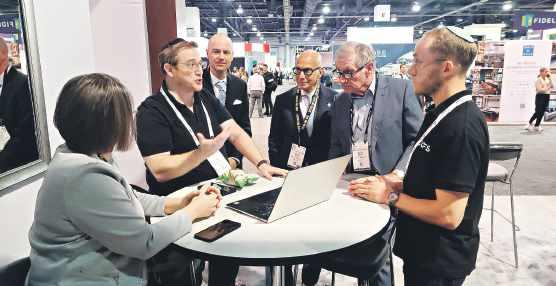
“We believe the next frontier in construction e ciency goes further than optimising individual projects, moving towards performance-driven portfolio management and beyond. We’re working towards a future where projects begin with realistic schedules, common mistakes are avoided, executives gain early visibility into potential problems and, ultimately, contractors’ margins and client relationships are significantly healthier.”
Founded in 2023 by Israeli brothers Ari and Aaron Segal, Caps for Sale is a play on the term Cap Rates and a nod to the founders’ favourite childhood picture book. CFS uses AI and predictive analytics to improve returns and reduce risk in real estate by predicting future tenant vacancies and provide a reliable riskscore for retail properties.
At its core, CFS aims to help people make smarter decisions faster. Real estate investors and lenders are constantly asked to evaluate and price risk – tenant risk, location risk, lease renewal risk – but the tools they use, say the founders, are mostly the same as they have been for the last few decades.
CFS’ AI-powered interface can help speed up this process and its machine learning models help to predict how a property will perform, particularly when it comes to whether tenants are likely to stay or go. CFS is initially focusing on retail, single-tenant and neighbourhood shopping centres.
Based in Israel with team members across the globe, it is focused primarily on the US market but the founders are in early conversations with UK-based investors and partners and earlier this year met major groups like British Land and Landsec. The company is working together with Time Retail Partners, a Londonbased real estate advisory firm.
Investment to date: $500,000 early capital – primarily from angel investors in the US, Israel UK. CFS is also raising $3m to scale its data team, sales and marketing and products.
What is the biggest challenge facing the property industry?
Ari Segal, co-founder and chief executive, says: “There’s a growing gap between the speed at which capital markets are moving and the pace at which the industry makes decisions. Margins are shrinking and investors need to act quickly to identify and capitalise on opportunities, but they’re still using spreadsheets and spend weeks underwriting deals. That disconnect leads to mispricing and missed opportunities.”
What challenges have you faced scaling in a slow-moving industry like real estate?
“Real estate is built on relationships and trust, which means new technologies have to prove themselves in real-world deals before they’re widely adopted. That’s been both the challenge and the opportunity. We’ve had to show our models work – not just in theory, but in underwriting decisions that generate real returns. We’ve also had to be patient and flexible. Some of our best customers were sceptical at first.”
How do you see your role in the broader digital transformation of the property sector?
We’re trying to move the industry from access to data to actionable data insights. There are plenty of platforms that collect and display
information. What’s missing are tools that help investors see around corners and act with conviction. That’s the space we aim to lead.
What trends do you see shaping the future of property tech in the next five years?
“Machine learning-driven underwriting will become the norm – not the exception – and real estate firms with large pools of proprietary data will start using them to expand their advantage further. Capital allocators will demand smarter, tech-enabled diligence from their managers and we may even see the tokenisation/commoditisation of the asset class which will allow for frictionless (and faster) trading of these assets.”
What’s next?
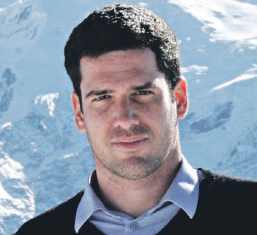
include some of the country’s largest build-to-rent operators and largest institutional landlords, from large banks and publicly listed property groups to the leading asset managers.
Investment to date: £6m from a leading VC and family o ces.
What is the biggest challenge facing the property industry?
Says Navot: “The biggest challenge is inertia – both in systems and in mindsets. Legacy platforms and incumbent providers are resistant to change, even as consumer expectations rise and operational ine ciencies become more costly. There’s an urgent need for digital transformation and data-led operations across the board.”
What challenges have you faced scaling in a slow-moving industry like real estate?
and adoption accelerates once partners see what’s possible.”
How do you see your role in the broader digital transformation of the property sector?
“We see ourselves as the infrastructure layer for modern residential lettings – making it possible to deliver a seamless, data-driven experience at scale. We’re not just improving one part of the process, we’re redesigning how the entire ecosystem works, from lead to lease.”
What trends do you see shaping the future of property tech in the next five years?
“AI and automation will fundamentally change how property management and lettings operate. Expect to see more predictive analytics for pricing and yield, hyper-personalised renter experiences and automation of everything from compliance to communication. ESG will also become central to both property strategy and tech solutions. Ultimately, winners will be those who can blend tech with trust.”
What’s next?
We’re rolling out a self-service SaaS version of our platform and onboarding several midmarket funds in the US. We’re also working on a pilot with a major CMBS underwriting group as well as three large full-service brokerages.
“On the tech side, we’re just putting the finishing touches to a highly sophisticated (and computationally intensive) ‘void analysis’ tool that helps in the re-tenanting and site selection process. We are also building new tools that help to identify underperforming assets in a portfolio and recommend targeted asset management strategies.
“We want CFS to be the go-to platform for any real estate investor looking to make smarter bets. That includes US and UK/European markets, across retail and other sectors. If we’ve done our job right, predictive analytics won’t be seen as a nice-to-have but a must for any smart investor.”
Founded in 2018 by Israeli entrepreneur Asaf Navot after years of experiencing the frustrations renters and landlords alike face in the traditional lettings market. Coming from a background in strategy and operations at Bain&Company, Navot was struck by how outdated, ine cient and opaque he says the rental experience was – especially in London.
Home Made was built to bring transparency, technology and trust to residential lettings, tackling all the ine ciencies within the rental market, redefining the future of property leasing and empowering rental operations at scale.
Today, Home Made is the UK’s leading multi-family leasing provider. It uses a scalable, AI-powered platform, increasing asset values by up to 30 percent. It o ers a fully integrated lettings platform that combines smart technology, centralised operations and deep market data and handles everything from marketing and viewings to compliance and move-in – all, say the company’s founder, with better performance and at a lower cost than traditional agents.
Based in London, Home Made is deeply embedded in the UK market. All its operations, clients and technology are focused on serving the UK residential rental sector. Partners
“Change management is a constant. Real estate is risk-averse by nature, and many players have become comfortable with inefficiency. Our biggest hurdle has been not just building a superior product but also convincing stakeholders to embrace a new way of working. Fortunately, the results speak for themselves,



“We’re scaling fast across the UK, expanding our footprint with institutional landlords and launching new tools to enhance the renter experience. We’re also deepening our use of AI to drive even better outcomes for our partners. Our mission remains clear: fix renting for good, making it better, safer and fairer to all.”














Jewish News is delighted to be entering a digital-first era with the launch of a new website and new regular glossy magazine. We are therefore seeking an enthusiastic, emerging sales force to help navigate this new era and to sell these exciting new products alongside opportunities with our portfolio of events and community-leading social media presence.
• Achieving personal and team sales targets. Working to the teams agreed yield and series framework.
• Championing digital first solutions with a particular focus on substantially growing New Business.
• Building and developing strong client relationships and attending meetings and events.
• Identifying revenue opportunities from new and existing accounts and selling solution based integrated campaigns.
• Successfully communicating and introducing digital campaigns to existing print clients.
• Effectively selling across the website, digital publications, social, newsletters, magazines and more.
• Working closely with the Jewish News Publishing and Editorial team to ensure a smooth and commercially successful relationship.
• Working with the Social Team to sell and implement new parthership content.
• Liaise with the Head of Finance to ensure all revenue is accurately reported and invoiced.
• SALARY: Approx 36k plus generous commission package but flexible depending on experience
Email a brief paragraph about yourself (and attach your CV) to Richard Ferrer – richard@jewishnews.co.uk

In
our thought-provoking

series, rabbis, rebbetzins and educators relate the week’s parsha to the way we live today
BY RABBI ARIEL ABEL SOLICITOR & ARMY CHAPLAIN
Our covenant with God is essential to our survival
This week’s Torah reading, Ha’azinu, is a song in which Moses delivers his final message to the people of Israel. Its verses, poetic and timeless, speak powerfully to the headlines – war, loss, resilience and hope. With the current conflict in Gaza and surge of antisemitism across the world, this parshah projects its message with renewed urgency and, at the same time, hope for a better outcome.
Moses begins by calling on the heavens and the earth to witness his words. He likens God’s teachings to dew, descending silently, yet vital for
life. Dew sustains the land without fanfare, and so too does the Torah sustain our people and give strength.
As Israel continues to defend itself, this imagery carries deep meaning. Just as the dew is essential to the land’s survival, so is our covenant with God essential to our national survival.
Without a spiritual core, military strength and political alliances are fragile and non-conclusive. When society abides by spiritual values and respects God’s word, divine blessing refreshes and renews us.
One verse from this song is especially poignant : “All his ways are just; a faithful God, righteous and upright is He.” These words are recited at funerals and resonate deeply as we mourn the innocent victims of terrorism. When faced with the
unpredictable prospect of stress and grief, it is expected we will struggle to understand God’s plan. Yet Moses teaches us to trust that divine justice is perfect, even when it seems hidden.
Moses also warns us not to put our ultimate trust in human beings. Leaders, governments and international organisations are all fallible and can change positions. We see this today as Israel faces diplomatic pressure and public protests worldwide.
The connection of the Jewish people to the Land of Israel does not depend on the approval of other nations or shifting global narratives. It rests on God’s promise to us –which has guided our people through millennia of exile and return.
Respect for political viewpoints in the countries in which Jews live is always forthcoming: we respect the
Recruit to Train CYP-PT Therapy Trainee in CBT Band 6 NHS Salary
Fully funded (1 full time post for 12 months)
Are you interested in a Postgraduate Diploma from UCL that’s fully funded, become a qualified therapist and earn a full time salary at the same time?
Noa Girls is a charity supporting adolescent girls in the Jewish Community.
We have an exciting opportunity for 1 Recruit to Train Trainee in CBT to join our team as part of the NHS England (NHSE) funded Children and Young People (CYP) Psychological Training programme (formally CYP-IAPT).
The training will begin in January 2026. You will receive a full-time salary whilst undertaking approx 2.5 days at university and 2.5 days working clinically at Noa seeing clients related to training assignments. You will have supervision by clinicians specialising in CBT and be supported by a clinical psychologist. Trainees will be both an employee of the service and an enrolled student with UCL/ Anna Freud. Upon completion, qualified trainees will receive a UCL Postgraduate Diploma.
For this unique opportunity we are seeking highly motivated candidates who are enthusiastic about making a difference to children’s mental health through evidence-based interventions based on NICE guideline recommended treatment.
More information can be found at www.noagirls.com.
If you are interested in applying, please call 0208 731 7025 to discuss the post further. This is a dual application process and your application form will be shared with the Anna Freud staff team as part of the recruitment process.
Closing date: 21st October 2025.
You will need to be available to start in January 2026
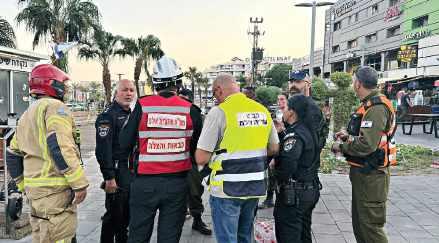
democratic processes of the West as a blessing to secure the freedom of worship and of expression. But the truth above all and the condition to the ways of humankind is the supremacy of God, and his word to us.
To help ensure we do not fall victim to new narratives that erase or render irrelevant the Torah’s teaching and message, the book of Deuteronomy urges us to take on board the lessons of history.
“Ask your father,” it says, “and he will tell you; your elders, and they will relate to you.” Memory is vital. Just as Moses described God’s care as an eagle carrying its young high above danger, the very existence of Israel today reflects divine protection. We have survived and rebuilt a homeland — a modern miracle. May that miracle and its benefits extend to all in its midst. May peace be restored and a cessation of all hostilities be a cause of celebration in this new Jewish year.
This is an opportunity to help revitalise a well-established and friendly South East London orthodox community with significant growth potential.
A house with a garden is provided. Kosher food can be delivered. Semicha acceptable to the Office of the Chief Rabbi is essential.
TO APPLY, OR FOR MORE INFORMATION www.catfordsynagogue.org.uk chairman@catfordsynagogue.org.uk
DEADLINE FOR APPLICATIONS: 31ST October 2025













BY RABBIS JOSH LEVY AND CHARLEY BAGINSKY CO-LEADS OF PROGRESSIVE JUDAISM
Rosh Hashanah is the festival of beginnings. Last week we celebrated the new year, dipping apples in honey and praying for sweetness. And yet, to speak of hope in this moment feels daunting. The weight we carry is immense: hostages still in Gaza, a population facing starvation and devastation, deep division across Israel and a rise in antisemitism here in Britain. These burdens come with us into synagogue; they cannot be left outside.
Still, Judaism insists despair is not an option. The Talmud teaches: “Even if a sharp sword rests upon a
person’s neck, they should not withhold themselves from mercy” (Berakhot 10a). This is not naïve optimism, but a call to resilience - even at the edge of despair, we must continue to believe in the possibility of change.
Last year, that teaching guided us as we made our own leap of faith, the creation of the Movement for Progressive Judaism. Liberal and Reform Judaism each carried proud histories, often walking side by side, sometimes apart.
To weave those stories into one has required courage, trust, and compromise. But above all, it has required hope. Hope that together our communities are stronger, that our children will inherit a Judaism that sustains them, that our collective voice will be clearer and more compelling in the world around us.
A stimulating series where our progressive rabbis consider Judaism in the face of 21stcentury issues

The Torah reading recited on Rosh Hashanah last week tells of Hagar and Ishmael cast into the wilderness. When the water runs out, Hagar turns away, unable to watch her child die.
Receive
hope – not to ignore the world as it is, but to act as if it can yet be remade.
Rosh Hashanah is not only about new beginnings in the abstract; it is about the work of renewal here and now. Each morning we say that God “renews creation daily in goodness”.
To be Jewish is to believe the world can be renewed – not someday, but today.
Our prayer in this season is for vision. For the return of the hostages. For an end to su ering in Israel and Gaza. For leaders with the courage to choose peace over war.
For our communities here, that we may hold one another in strength and compassion.
Rabbi John Rayner put it simply: “To a rm God is to a rm that humanity can live in peace and harmony, and become a society of liberty, justice, compassion and love.”
That is what it means to live with
Then God opens her eyes, and she sees the well that was there all along. The rabbis remind us that the desert is real. The su ering is real. Hope does not deny reality, but it does open our eyes to new sources of life.
This new year, may we find the courage to hope, and the resolve to act on that hope.
May we see the wells in the wilderness, and drink deeply from them together.











NETANYA
Over 200 SQM duplex
5 Bedrooms
3 Bathrooms
2 Parkings & Storage
Pool & Gym in building
Fully furnished
Asking Price: ₪ 8.5M / £1.91M
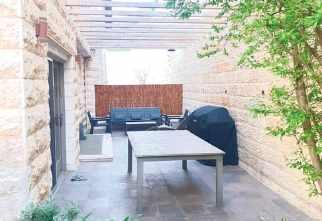
EFRAT
Zayit
Over 400 SQM
10 Bedrooms
Excellent condit ion
Great community
Ready to move in
Asking Price: ₪ 9.7M / £2.18M


JERUSALEM
German Colony Harakevet Street
150 SQM duplex penthouse
3 Large bedrooms
2 Large sukkah balconies
Prime location
Asking Price: ₪ 10.9M / £2.45M

JERUSALEM
Presale
Luxury Complex
Gym
Close to shops and cafes
Fantastic
Price upon Request
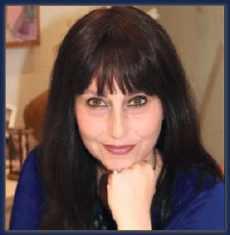

NEVE SHAMIR
Ramat Beit Shemesh
100 SQ M
Renovated
3 Bedrooms
2 Bathrooms
Across from Yarmut park
Asking Price: ₪ 2.85M / £640K

CARMEI GAT
Presale
Fastest growing anglo community in Israel
Over 400 units available
2, 3, 4 & 5 bedrooms available
Selling fast
Price upon Request




ANTIQUES
Antique – Reproduction – Retro Furniture (any condition)
Epstein, Archie Shine, Hille, G Plan, etc.
Dining Suites, Lounges Suites, Bookcases, Desks, Cabinets, Mirrors, Lights, etc.
House clearances
Single items to complete homes
MARYLEBONE ANTIQUES - 8 CHURCH STREET NW8 8ED 07866 614 744 (ANYTIME) 0207 723 7415 (SHOP)
closed Sunday & Monday
STUART SHUSTER - e-mail - info@maryleboneantiques.co.uk
MAKE SURE YOU CONTACT US BEFORE SELLING



Friendly Family Company established for 30 years We clear houses, flats, sheds, garages etc. No job too big or too small! Rubbish cleared as part of a full clearance. We have a waste licence. We buy items including furniture bric a brac. For a free quote please phone Dave on 07913405315 any time.


Confidential Bereavement Counselling for adults and children individually. Support Groups available. We offer in person, online and telephone counselling. Contact Jewish Bereavement Counselling Service in confidence. 0208 951 3881 enquiries@jbcs.org.uk | www.jbcs.org.uk

Call our Legacy Team on 020 8922 2840

Furs, Jewellery, Old Costume Jewellery, Watches, Silver, Designer Bags, anything vintage. 01277 352560 10 Golders Green Road London NW11 8LL Opposite Cafe Nero
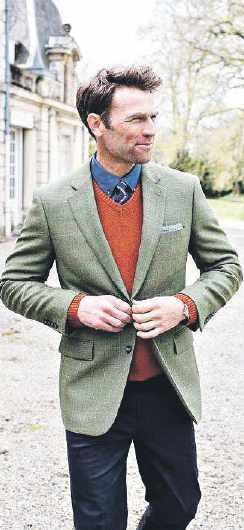









eaving Your Legacy
